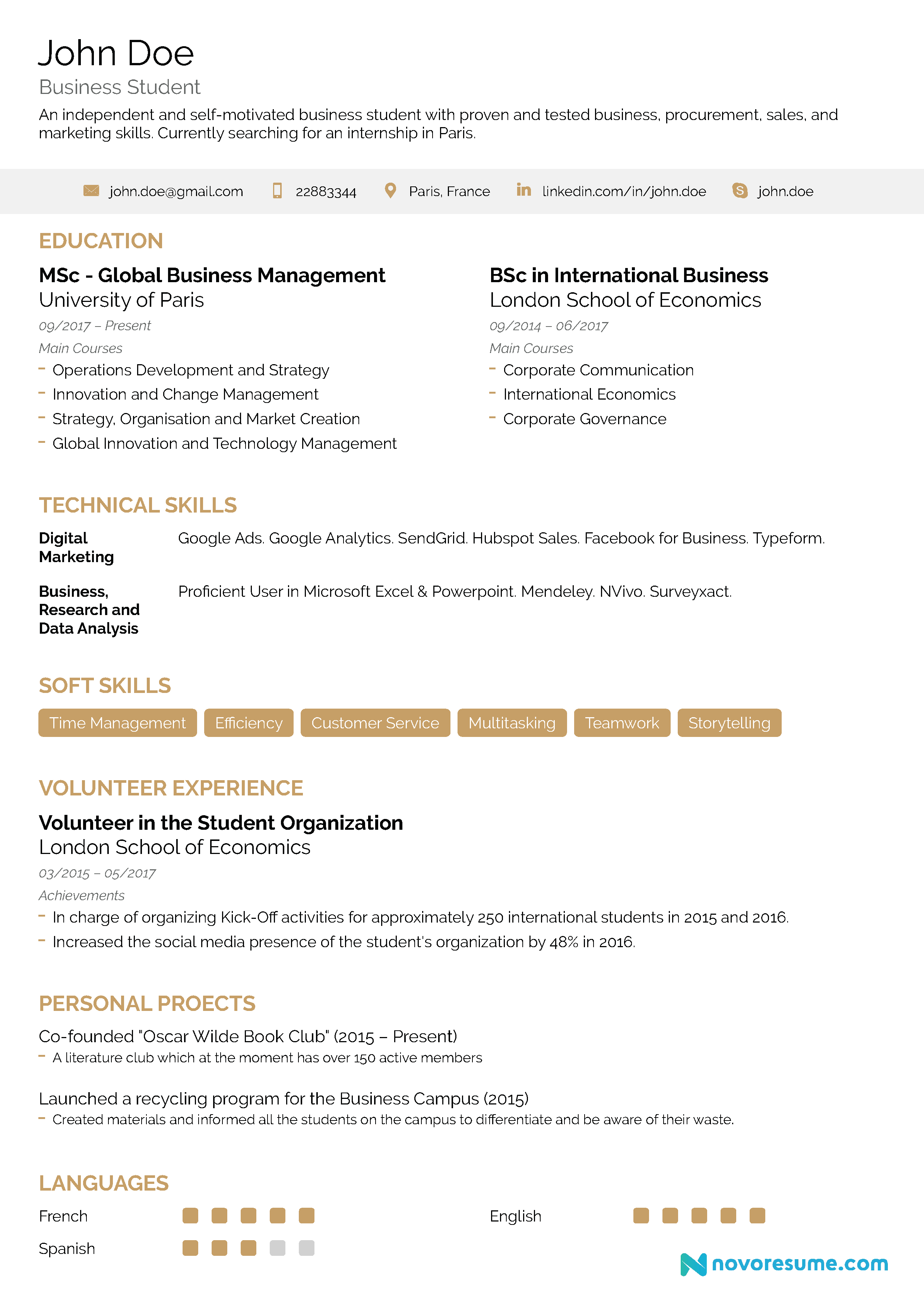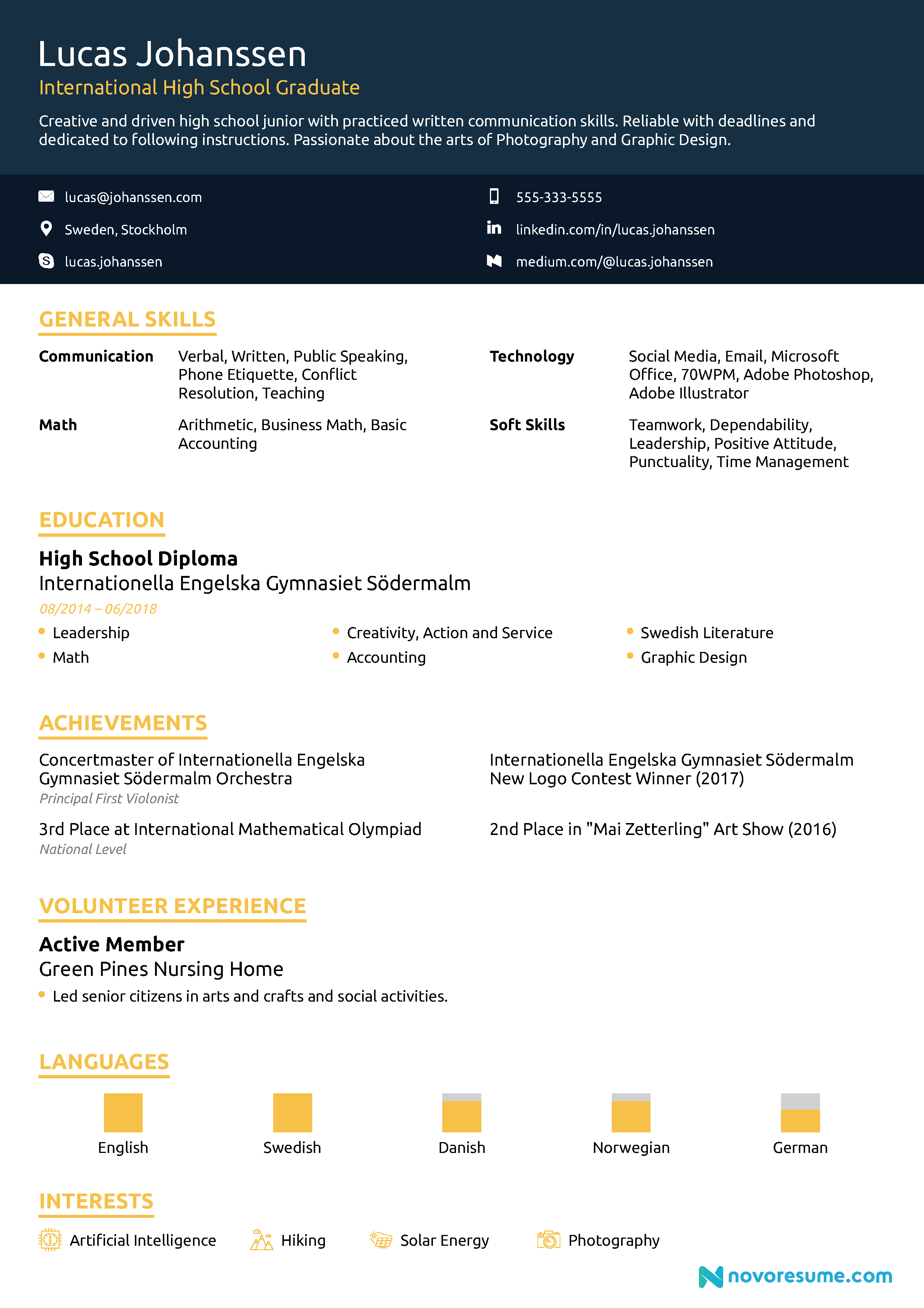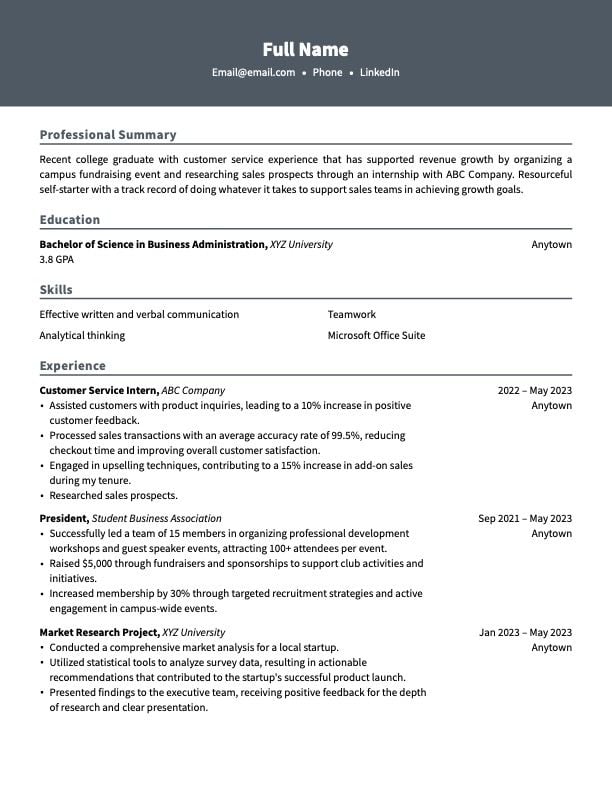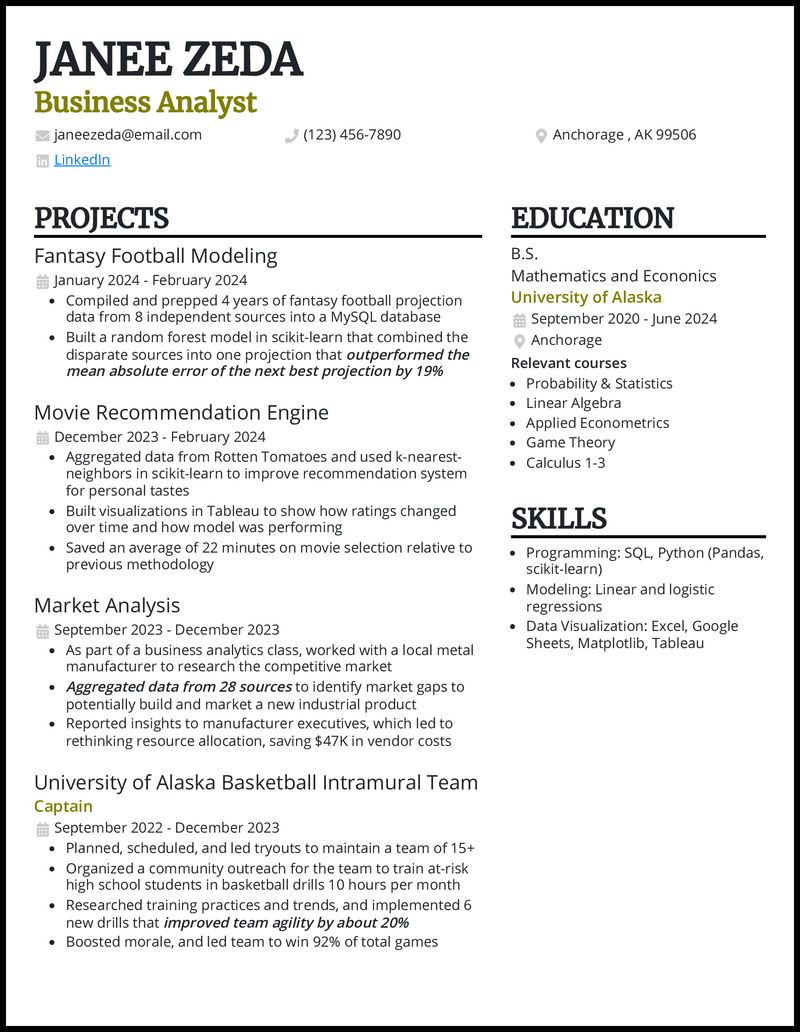How to Write a Resume with No Experience [21+ Examples]

It’s time for your first job hunt !
You need to write a resume , which can be nerve-wracking if you don’t have any real-life work experience.
You don’t know where to start, what to include, or which resume format to choose.
On top of that, most advice you find online isn’t relevant because it focuses on emphasizing professional background.
Chances are, you’re straight out of college with no experience to speak of.
Or maybe you're a high-school student applying for a part-time job.
Whichever the case may be, you’re probably having trouble filling in the blank space on your resume that’s supposed to be the work experience section.
Worry not, though. In this guide, we’re going to help you create an AMAZING resume, no work experience is needed.
- How to format your resume with no work experience
- 4 sections to replace work experience (that help you stand out)
- 2 no-work experience resume samples (guaranteed to land you the job)

How to Format Your Resume [with No Work Experience + Examples]
A resume format is the layout of your resume .
The ideal resume format usually depends on how much work experience you have.
But what happens when you have none?
For a no-experience resume, we recommend that you use the reverse-chronological format .

It’s the most popular format amongst applicants and a recruiter favorite.
The sections in your reverse-chronological resume will be:
- Header : Contact Information and Resume Statement
- Internships, extracurricular activities, projects, volunteer work (These sections will replace your work experience)
In this article, we’ll walk you through each of these sections, and explain how to write them in a way that you stand out from the crowd.
Let’s dive in.
Start With Your Resume Header

Your resume header includes your contact information and your resume statement.
Below, we’ll show you how to write both of these elements and how to include them in your header section.
Put Down Your Contact Information
Just like the name suggests, the first thing you add to your header is your personal and contact information.
It’s the easiest part to get right, just keep it short and to the point.
In your contact information section, mention the following:
- First and Last Name
- Phone Number
- E-mail Address
- A link to a professional profile (e.g. LinkedIn ) or personal webpage (if you have one)
Make sure to use a professional-sounding E-mail.
I.e. something along the lines of “[email protected].”
You’re sure to leave a wrong impression if you use an email you created back in preschool ( “[email protected]” ).
Make sure to double-check, triple-check your contact information. After all, the recruiter can’t contact you if you have a typo in your phone number.
(Optional) Write Your Resume Objective
A resume objective is a short heading statement in your resume, where you describe your professional goals and aspirations.
Fun fact - hiring managers look at your resume for 5-6 seconds max .
Yep, that’s right. In most cases, the hiring manager is literally drowning in resumes. So, they have a couple of seconds to skim each one.
Well, this section is your chance to catch their attention (and let them know you’ve got what it takes).
A resume objective is usually 3-4 sentences max and includes information on:
- What your field of study is;
- What your skills and experiences are (ones that are relevant to the job );
- Why you’re applying for this position and/or this company.
As with contact information, you don’t need to label your resume objective with a title. Just write it underneath your contact information section.
Here’s an example of what a resume objective looks like:
“ Recent Communications graduate looking to apply for the role of Secretary at XYZ inc. Extremely organized with good writing and multitasking skills. Practical experience in management gained through several university projects, which involved coordinating tasks between different team members and ensuring that everyone was in sync with the latest information. ”
Emphasize Your Education

In your average resume, the first section would be work experience.
Since you don’t have any, though, you’ll want to omit that and replace it with the education section.
This way, you bring a lot more attention to your education, which is one of your main selling points.
What should you include in the Education section?
List the following features in this order:
- Name of the degree
- Name of the institution
- Years attended
- Location of the institution (optional)
- GPA (optional)
- Honors (optional)
- Relevant coursework (optional)
- Exchange programs (optional)
As a general rule, if you studied in a prestigious university, you can add the name of the institution before the degree . This way, you will catch the recruiter’s attention faster.
Now, let’s go through some real-life examples:
BA in Computer Science
Tufts University
Medford and Somerville, Massachusetts
10/2015 - 06/2018
Magna Cum Laude
- Exchange Program in Greenville, NY
University of the Arts London
BA in Interior Design
10/2017 - Ongoing
Westwood High
Boston, Massachusetts
Class of 2018

Education Section Q&A
Still have some questions about the education section? Worry not, we’re about to give you all the answers!
Do I include my GPA?
- The answer here is a “maybe.” We’d recommend including a GPA if it’s higher than 3.5. Anything lower than that, and you might be underselling yourself. Keep in mind, though, that most employers don’t care about your grades.
Should I include my coursework?
- Yep, but just as long as it’s relevant. If you have no work experience, including courses can help establish your expertise in a field. Feel free to skip out on any basic courses, though. No one cares about your Maths 101 course.
Do I mention my degree if I dropped out?
- If you studied for more than 2-3 years, yes. A half-finished degree is still better than no degree. If you dropped out after a semester, though, that doesn’t really mean much.
Do I mention my high school degree?
- Only if it’s your only degree. If you have any higher education, your high school degree will only take up space.
4 Sections to Replace Work Experience [With Examples]
Now that you’ve listed your education, it’s time to fill that work experience gap in your resume.
You aren’t still worried about your lack of experience, right?
Because here are four sections you can use instead:
1) Internships
Have you done an internship that is relevant to the position you are applying for?
Now’s the time to mention it.
Here is how you add an internship to your resume:
First , place the Internship section right after the education section.
Title it: Internships
Second , write your internship title and role . Be specific.
If your internship was in the marketing department, instead of just “Intern”, say “Marketing Intern”.
Third , put down the company name , location , and duration of the internship - in that order.
Marketing Intern
Full Picture
New York, NY
09/2019 - 12/2019
Easy and straightforward, right?
One more step:
Last , add a list of responsibilities you had as an intern in bullet point form.
If you have any tangible achievements , even better! Write those in as well.
Finally, tailor both the responsibilities and achievements to the role you’re applying for.
Here’s how that looks in practice:
You used to be an Advertising Intern .
You’re applying for the position of Social Media Assistant .
Here’s how you would put down your internship entry:
Internships
Full Picture Company
- Analyzed various social media platforms for trending content
- Managed company social media accounts
- Posted interested content on company Facebook page, increasing engagement by 25%
The listed responsibilities and achievements are directly connected to the Social Media Assistant job requirements.
You’re applying for a Content Writer position. Take a look at the same entry now:
- Assisted the Marketing Manager in writing press releases and new blog posts , which increased web traffic by 25%.
Notice how the internship title remains the same.
But in this case you’re applying for a Content Writer position, so you are highlighting your writing experience instead.
For more examples, check out our full guides to an internship resume and how to write a cover letter for an internship .
2) Extracurricular activities
Still have a ton of empty space in your resume?
Extracurricular activities are always a great addition!
Whether they’re related to the job you’re applying for or not, they still show one thing:
You’re hard-working and motivated.
Imagine you’re the HR manager, and you can pick between these 2 candidates:
- Josh Johnson. Studied at Massachusetts State. 4.0 GPA, but that’s all he did in college - no extracurricular activities, internships, or anything else.
- Suzie Activeson. Also studied at Massachusetts state. 3.2 GPA. Vice-president of the business club. Served as a student government senator for 2 semesters. Organized several events as part of the marketing club.
Sure, Josh is probably qualified, but we don't know anything about him, other than that he studied a lot.
Suzie, on the other hand, can manage a team (business club VP), organize events (marketing club), and is passionate about making a change (student government).
So, which one would you pick?
Now, let’s explain how to list extracurricular activities on your resume:
- Title of the section: Extracurricular Activities
- Name of the organization and/or team
- Your role in the organization
- Time period
- Noteworthy awards or achievements
Extracurricular Activities
Public Speaking Club
Vice-President
09/2018 - 09/2019
- Organized 10+ public speaking lectures
- Brought in speakers from all over the state
- Conducted public speaking workshops
3) Volunteering Experience
Volunteering shows dedication and passion to apply yourself.
And there’s nothing recruiters love more than a committed employee.
Whether you spend your free time in a soup kitchen, or you helped collect trash in the countryside, you can mention it in your resume!
But how do you list volunteering experience?
Well, it follows the same logic as your internship and extracurriculars:
- Title of the section: Volunteering Experience
- Name of the organization
- Relevant tasks and achievements (bullet points)
Volunteering Experience
Grand Archive Library Volunteer
Washington, D.C
08/2017 - 02/2019
- Performed secretarial activities, such as sorting mail, filing documents, answering phone calls, and taking messages.
- Led a poetry reading event twice a month.
4) Projects
In this section, you can add any relevant projects you were part of during your time in school or at an internship.
Your capstone project, graduation thesis, or research project go here.
No need for work experience!
You can also mention any other type of project you’ve worked on in school, including:
- Business project for a real-life client
- Mock website you created in Web Design 101
- Fake magazine you created as a capstone project
- Market research you did as part of your graduation thesis
- Software you developed in Software Engineering class
...And so on!
Here’s how you put them down:
- Title of the section: Projects
- Project name
- Project type
- Related organization
- Relevant responsibilities and achievements (optional)
And now, for some practical examples. Here’s what a journalism student project could look like:
Online Privacy and Social Media: a Journalistic Study of Facebook and Cambridge Analytica
Journalism Capstone Project
Harvard University
09/2018 - 11/2018
And here’s a law school example:
In-House Pro Bono Project
Columbia Law School
11/2018 - 03/2019
- Completed a full petition for U nonimmigrant status, interviewed legal persons and drafted affidavits.
If you have anything physical to back up your project with, feel free to include a link.
For example, if you’re a developer, you could include a link to your GitHub profile.
Stand out with your Skills

There are two types of skills you can include on your no-experience resume:
Soft skills and hard skills.
What’s the difference?
Soft skills are attributes or habits that describe how you work. They are not specific to a job, but indirectly help you adapt to the work environment.
Here are some of the most popular ones: teamwork, responsibility, leadership, creativity, etc.
Hard skills , on the other hand, refer to specific tools, technical knowledge and training and other work-specific skills. They apply directly to the job.
Technical writing, C++, financial accounting, etc. are all examples of hard skills.
So, which of these skills should you include?
That depends on a lot of factors, but as someone with no work experience, you should opt more for hard skills .
See, you could write all the cool buzzwords like “Critical Thinking” and “Leadership,” but the recruiter won’t believe you.
Fun fact - that’s what 90% of students do.
Instead, you should focus on skills that make you stand out , and in most cases, those are hard skills.
So, how do you decide which hard skills to mention? Easy! Just check the job ad you’re applying for.
Let’s say you’re applying for an entry-level creative internship, and you find these requirements in the job description:
- Video editing experience (Premiere, After Effects)
- UI design experience
- Photo editing experience (Photoshop)
- Photography experience
- Experience with Adobe Illustrator
You’d transfer this into your skills section:
- Premiere & After Effects - Expert
- Photoshop - Expert
- UI Design - Intermediate
- Adobe Illustrator - Intermediate
- Photography - Intermediate
Not sure which skills to mention? Check out our article on 150+ must-have skills for all sorts of professions !
Other Sections You Could Include in a No-Experience Resume
A resume without experience does have one advantage: extra space .
You can use this space to create other sections that highlight how awesome you are!
Here are some sections you could include:
- Hobbies and Interests . Add flair to your resume by showing your genuine passion and interest in the industry.
- Languages. Do you know a second language? Or even a third? Awesome! Most companies these days are pretty international and appreciate an extra language skill or two. Be mindful not to over-exaggerate your proficiency, though. Only knowing how to ask “¿Donde está la biblioteca?” doesn’t warrant a Spanish entry on your resume.
- Awards & Certifications . Do you have any fancy pieces of paper that show you’re smart? Maybe it’s an award for a terrific essay in a competition, or a certificate from an online course . Whichever the case may be, awards and certifications show that you’re a winner, so definitely include them in their own respective section.
Need Inspiration? 2 No Work Experience Resume Samples
Do you still have questions or don’t know where to begin?
That’s when a resume sample comes in handy.
It provides you with a predetermined format.
It also helps you picture how your no-experience resume is supposed to look like.
As Picasso put it: Good artists copy; great artists steal!
Here are 2 no work experience resume samples you can borrow ideas from:
Business Student Resume Sample

High-school Student Resume Sample

Create a Matching Cover Letter
All done with your resume?
It’s not over yet. You need to write a cover letter to go with it.
A cover letter is a single-page letter that accompanies your resume and is part of your job application.
Look at it this way: your resume describes your experiences, and your cover letter explains (in simple words) how they’re relevant to the job.
Now, here’s a quick infographic on what to include in a cover letter:

Finally, as with everything else in your resume, make sure to keep your cover letter relevant, short, and concise.
The hiring manager doesn’t have time to read an autobiography, they’ll only review your cover letter for a few minutes.
There’s a lot more to creating a good cover letter than what we just explained.
For a complete, all-you-need-to-know walk-through, check out our Complete Guide on How to Write a Cover Letter !
Key Takeaways
...and that’s a wrap!
At this point, you should know everything there is to know about writing a killer no-experience resume.
Just to keep things fresh, though, let’s quickly go through everything we’ve learned so far:
- When creating your no-experience resume, use the reverse-chronological format.
- You can create a killer no-experience resume by emphasizing your education instead. Include relevant internships, soft & hard skills, and projects.
- Other sections you can include on your resume are hobbies & interests, languages, certifications, or achievements.
- Keep all the content on your resume clear, precise, and relevant. Use bullet points for all your descriptions.
- After you’re done with your resume, you want to write an awesome cover letter that goes with it. The cover letter is a one-page letter that tells the story behind your resume content and reemphasizes why you’re a great fit for the job.
Related Resume Examples
- Internship Resume
- High School Resume
- Research Assistant Resume
- College Resume
- Students and Graduates Resume
- Teacher Resume
Recommended Readings:
- 43+ Resume Tips and Tricks to Land Your Next Job in 2024
- 20+ One-Page Resume Templates [Free Download]
- 35+ Common Interview Questions and Answers [Complete List]

To provide a safer experience, the best content and great communication, we use cookies. Learn how we use them for non-authenticated users.
Protect your data
This site uses cookies and related technologies for site operation, and analytics as described in our Privacy Policy . You may choose to consent to our use of these technologies, reject non-essential technologies, or further manage your preferences.
- Resume and Cover Letter
- Guide to Writing a Great...
Guide to Writing a Great Resume with No Work Experience
16 min read · Updated on February 13, 2024

No work experience? No problem.
The ol' catch-22: you need a job to get experience, but you need experience to get a job. Either way, you need a resume, and what you don't need is to panic.
Just because you don't have skills that are relevant to the job, or experience in a traditional work setting, doesn't mean you can't craft a convincing first job resume. Whether you're a high school or college student, you may be wondering: how do you write a resume with no work experience? Well, we'll tell you with these expert tips.
1. Choose the best format for a resume with no experience
There are a few dominant resume templates in use today:
Chronological
Hybrid - a blend of the chronological and functional formats
A chronological resume format lists a candidate's work experience in reverse-chronological order and a functional resume format focuses on highlighting the candidate's hard and soft skills and achievements, rather than work experience. While the functional and hybrid resume formats can be attractive options for job seekers with little relevant experience, most employers and hiring managers prefer a chronological format.
Aside from hiring managers preferring it, it's best to use a reverse chronological resume for two additional reasons:
It's the most used format in the US, making it easy for hiring managers to review and find the information they're seeking
It's the most liked by employers' applicant tracking systems, or ATS. If an ATS can't read your resume properly, it might not get into the hands of a human reader - even if you're the perfect candidate for the job
The primary sections of a reverse chronological resume are:
The heading (with your contact information)
Resume summary
Work experience (which will be substituted with other sections when you have no work experience)
Education
2. Incorporate your contact information
Now that you've chosen the best format for a resume with no experience, it's time to complete each section. The first section of your resume is the header section. This is the section that includes your name and contact information. In this section, you'll provide:
Phone number
Email address
Location and zip code
LinkedIn or professional website URL (optional)
Your name should sit above your contact information in a larger font size than the rest of the information included in the header. You also want to ensure you use a professional sounding email address. Using something like “[email protected]” or “[email protected]” will likely come across as unprofessional and won't gain you any points for the “yes” pile. A good choice is to use your name (or a combination of your initials and surname), instead.
Here's an example of how to list your contact information at the top of your resume:
Joseph Smith
555.555.5555 | [email protected] | WV 26250 | linkedin.com/in/jsmith28
3. Include a strong summary statement
The next section of your resume, your Resume Summary, will fall just below your contact information. Your resume summary is not to be mistaken for a resume objective.
Resume objective statements , where you state exactly what career goals you wish to achieve, have mostly fallen out of fashion. This is largely because you want to focus on what you can do for the employer, not what the employer can do for you. A resume summary statement, on the other hand, sums up who you are professionally at the top of the page in two to five sentences and serves as the first impression you give a hiring manager to entice them to keep reading.
For a resume with no experience, your resume summary can still pack a punch. Include some of the key skills you have relevant to the job, while emphasizing your major and any type of experience that speaks to your ability to succeed.
Here's an example of a resume summary for a recent grad with a human resources degree:
Human resources graduate with diverse knowledge base in employee relations, benefits design, employment law, and policy design. Avid learner with solid written and verbal communication skills and a strong desire to support all levels within an organization for improved employee morale and productive collaboration.
4. Substitute the Work Experience section with other types of experience
Writing a resume with no experience can feel like a daunting task. Fortunately, recruiters and hiring managers are seeking candidates that have a robust background, regardless of experience level. Here are some sections you can substitute in lieu of a Work Experience section:
Internships
Graduate assistantships, extracurricular activities.
Volunteer Work
Hobbies and Interests
When you include these additional types of experiences on a resume, you can include them as a standalone section or create a “Relevant Experience” section. Depending on the type of experience you're including, you might find it's best to use a section heading that aligns with the type of experience (“Internships” for internships, “Volunteer Work,” for volunteer work, and so on).
Landing paid or unpaid college internships are one of the best weapons you have against "experience required." Not only do they give you some real-world work experience, they also allow you to network and make connections that can put you in a job later. When applying for a job without experience, be sure to list any internships you've completed.
If you haven't had an internship, consider applying for one as a step before an entry-level job.
Here's an example of how to include an internship on your resume:
Finance Intern
New York Secretary of State Office, New York, NY
Jan 2021 - May 2021
Reconciled budget sheets for quarterly processing
Supported accounting team in year end tax return audits
Analyzed 15 budget reports over a two-month period to ensure accurate data reporting
Similar to internships, a graduate assistantship secured during school is also a great way to gain valuable experience to include on a resume. Graduate assistantships are paid opportunities provided to graduate students. They typically involve part-time teaching or research within their field of study.
Here's an example of how to include an assistantship on your resume:
HR Graduate Assistant
West Virginia University School of Business and Economics, Morgantown, WV
August 2020 - May 2021
Reviewed 100 collective bargaining agreements to identify and document similarities and inconsistencies throughout
Worked with academic Professors to develop research guidelines for future assistants
Volunteer work
When surveyed, the majority of employers say that they take volunteer experience listed on your resume , such as being a soup kitchen volunteer, into consideration alongside paid work experience. So any volunteer work that highlights your talents or a new skill should be put on your well-prepared resume.
You'll list volunteer work in a similar way to how you would list internships and actual work experience:
Animal Transport Volunteer
Friends for Life Animal Shelter, Philippi, VA
April 2022 - Present
Working with local shelters to transport animals to and from shelters and foster homes
Assisting in cleaning kennels and common areas to support sanitation efforts
Spearheading animal supply drive, collecting $10K worth of supplies
Though it might not seem like it at first, extracurricular activities can add a lot of value to your resume in lieu of work experience, if you can relate them to the job you're applying to. For example, if you were an officer for a club during college or a captain of a sports team, these roles speak to leadership ability.
In general, these types of activities show you have the ability to collaborate with others. It also shows you have the ability to keep up with school work while being involved in other areas outside of school, which speaks to time management and organizational skills.
Here are some of the top extracurricular activities to include on a resume with no experience, as well of some of the skills they help to highlight:
Artistic endeavors: speaks to creativity, problem solving, perseverance, ability to learn
Sports: speaks to teamwork, collaboration, hard work, problem solving, conflict resolution
Club leadership roles: speaks to leadership, organization, perseverance, time management
General club membership: speaks to time management, community involvement, prioritizing
Student government: speaks to leadership, public speaking, time management, problem solving, organization
Here's an example of how to list extracurricular activities on a resume with no experience:
Student Council Vice PresidentBelington High SchoolAugust 2020 - May 2021
Spearheaded clothing drive to support the homeless in the state of Virginia
Wrote and delivered 3 speeches to the student body focused on student wellbeing, fundraising events, and life beyond high school
Special Projects
If you completed job-related projects during high school or college, they can be a valuable addition to your resume. Personal projects are also game for a resume with no experience, if they're relevant to the job.
Here's how you might list a personal project on your resume:
Social Media Campaign
Sparkle and Shine Fundraising Event
February 2022 - Mar 2024
Created social media campaign to support fundraising efforts for local children's shelter, supporting education in underprivileged youth
Increased followers by 25% in two months
Generated leads that converted to $3,000 in donations
Here's how you might list school projects on your resume:
Beaumont University
Masters in Counseling and Development
Career counseling planning design for women with chronic fatigue syndrome
Group counseling proposal for friends and family members of those who have mental health challenges
Behavioral health program design to work with males ages 18 to 30 with adverse childhood experiences
Hobbies and interests
It's more common today than ever before to include hobbies and interests on a resume - they help to provide insights into who you are as a person, to enhance your resume story. Hobbies and interests require soft and hard skills, many of which are required to succeed on the job, and they can especially be useful to fill in gaps when you lack work experience.
For additional information on how to list hobbies and interests on your resume with no experience, refer to “ How to List Hobbies and Interests on a Resume (With Examples) .”
An award can signal to an employer to take note, since they're a distinction that speaks to your skills, abilities, and accomplishments. Adding an Awards section is an excellent way to showcase your ability to succeed in lieu of work experience.
When you list an award, include the award and issuing institution. For example:
2023 Science Olympiad Award recipient, Science Olympiad Foundation
Certifications
Acquiring certifications provides an excellent opportunity to add value and fill in gaps in terms of skills and work experience. There are a lot of opportunities to secure certifications for free through sites like LinkedIn Learning, Udemy, and Grow with Google . Certifications not only highlight your skills but also show that you're focused on personal and professional development, which employers appreciate in candidates.
You can list certifications in a standalone Certifications list or with your Education section. For more information on how to best include certifications on a resume with no experience, refer to “ How to List Certifications on a Resume (with examples) .”
5. Include your education
When you have work experience, it's common to include your Education section after your Work Experience section. However, on a resume with no experience, many opt to list and emphasize their education after the resume summary. This is largely due to the fact that your education is what's most relevant to employers when you're straight out of school.
Also, in lieu of a Work Experience section, especially if you're running thin on any of the relevant experience options listed above, you can expand and focus on the education section on your resume to highlight the marketable skills you've developed. What can you do well that this job requires? What will be useful to the hiring company? What have you done in school and what have you studied that has prepared you for assuming this job?
This is generally a little easier if you're a college graduate with specialized education, but even a high school graduate can talk about their electives and relevant coursework, why they wanted to take them, and what they learned from the class. It's also acceptable to include any awards, scholarships, honors, or any student clubs and committees you participated in. For example, if you were on the Dean's list, include it.
Many also wonder if they should include their GPA on their resume. The short answer is yes, if it's 3.5 or higher. This level of achievement highlights your potential and the hard work you're willing to put in for success.
Here's the order to list items in your Education section, with items 5 to 8 being optional:
Degree issued
Issuing institution
City and state of institution
Graduation date (or expected graduation date, if in progress)
Relevant coursework
Student committees
Here's how your education might look laid out on your resume:
Bachelors of Science - Psychology (3.5 GPA, magna cum laude)Maryland State University
Relevant coursework: human growth and development, assessment, treatment planning, abnormal behavior
6. Emphasize your skills
Even when you don't have actual work experience, you have definitely acquired skills to support you on the job, which can set you apart from the competition. Be sure to highlight both hard and soft skills on your resume. You can do this by including a Skills section near the end, or by adding a Core Competencies section just below your Resume Summary.
You also might be wondering what the difference is between hard and soft skills. Hard skills are technical skills that are measurable and learned. Softs skills are tangible skills that are difficult to measure.
Examples of valuable hard skills on a resume include:
Mathematics
Computer skills
Data analysis
Project management
Social media
Language skills
Here are some common soft skills employers seek in their employees:
Communication
Problem solving
Organization
Interpersonal skills
Time management
Working well under stress
7. Add a cover letter
Even if one isn't required, it's generally a good idea to send a short cover letter along with your resume. Cover letters are where your personality comes out and you can use them to make the case for why you're the perfect candidate for this job.
A standout cover letter can convince an employer to bring you in for an interview, even if your resume itself doesn't have all the things they'd like to see. Your cover letter provides you with the opportunity to show a bit of personality and express why you're interested in the job, as well. Be sure your cover letter uses the same font and style as your resume, for consistency.
Elements you should never include on a resume
While there are many elements you should consider adding to your resume, career experts say there are a few things you should never include because they waste space, don't tell the employer anything relevant, or could damage your personal brand. This list includes, but is not limited to:
Employment references
Writing samples
Photos of yourself
Do not add this information to your resume unless an employer or recruiter asks you to provide it.
Additional tips for a resume with no work experience
As you develop your resume with no experience, here are a few more tips to consider.
Take stock of your achievements and activities
Make a list of absolutely everything you've done that might be useful on a resume. From this list, you'll then need to narrow down what to actually include on your resume. Different things might be relevant to different jobs you apply for, so keep a full list and pick the most relevant things from it to include on your resume when you send it out. This will help you to identify which sections to include in lieu of work experience.
Pay attention to technical details
When editing your resume, make sure there are no punctuation, grammatical, spelling, or other errors that will make your resume look unprofessional. Then, have a friend or family member read it again to catch any mistakes you might have missed — you can't afford a typo or missing word as a candidate with no prior work experience. Also, be sure to vary your language and use action verbs throughout your resume to keep your reader engaged.
Keywords, keywords, keywords!
Most employers use some form of applicant tracking system (ATS) to scan and sort resumes . This may seem unfair, but it's the reality of modern-day hiring. To combat this, you'll want to come up with, and include, a list of keywords in your resume when applying for any job. The best place to find these keywords is in the job post itself, or in ads for similar jobs. One caveat: don't use meaningless "buzzwords," such as "go-getter," "team player," and “detail-oriented." Unfortunately, sometimes these buzzwords are the only keywords listed in the ad. If that's the case, you'll need to sneak them in alongside your detailed accomplishments and academic achievements.
Customize your resume for each job you apply to
The last and most important thing to remember when creating a good resume is to customize it for every job to which you apply . Different job postings are going to have different keywords, different job duties listed, and so on. Appealing to each individual employer's needs and job requirements is the best strategy for getting your application noticed and hopefully landing your first job.
Relevant experience goes beyond work experience
At the end of the day, the only perfect resume is the one that gets you the interview. Regardless of whether you have work experience or not, it's still possible to stand out by highlighting other types of experience that relate to the role.
Even once you're comfortably employed, be prepared to tweak and update your resume to get noticed with each job application you submit. In the meantime, use any type of relevant experience to help you shine and land an interview. Sooner or later, you'll land that job - and gain that much-coveted relevant work experience.
Tackling this kind of resume isn't easy. If you've recently graduated or are in an entry-level job search, a professional resume writer can prepare you for success.
This blog was originally written by Riya Sand and has been updated by Ronda Suder.
Recommended reading:
5 Things You Should Always Include on Your Resume
Should You Include Social Media on Your Resume?
How to Be a Great Candidate Even If You're Under-Qualified for the Job
Related Articles:
How to Maximize Your Resume Action Words to Wow the Employer
Is Your Resume Inspirational? If Not, Here's How to Fix It
7 Ways You Try Too Hard in Job Applications
See how your resume stacks up.
Career Advice Newsletter
Our experts gather the best career & resume tips weekly. Delivered weekly, always free.
Thanks! Career advice is on its way.
Share this article:
Let's stay in touch.
Subscribe today to get job tips and career advice that will come in handy.
Your information is secure. Please read our privacy policy for more information.
How to Make a Resume With No Experience

Making a resume early in your career feels like a classic catch-22: A good resume highlights relevant work experience, which you don’t get until you land a job.
The truth is you don’t always need professional experience for entry-level jobs. By highlighting your existing skills, coursework and extracurricular activities, you can craft a resume that will impress employers — even without work experience.
Writing a resume with no experience
- Start with a professional summary
- Emphasize your education
- Include relevant experience like internships and extracurriculars
- Highlight your accomplishments
- Showcase your skills
- Don’t include a headshot, hobbies and other unnecessary details

Even if you don’t meet all the requirements described in a job description , there are still ways to write a resume that catches a company’s eye. First, you may want to get your hands on a resume template (word processors like Google Docs and Microsoft Word have resume templates to guide you with a general structure). From there, you can fill in the details by following the tips below.
1. Start With a Professional Summary
Career coaches have mixed opinions on including a short professional summary at the top of your resume. Lesa Edwards, founder of Exclusive Career Coaching and the former director of the career center at Truman State University , is in favor of a professional summary because it can set the stage and contextualize the experiences that follow. It also allows you to set yourself apart in a large stack of resumes.
If you decide to include a professional summary, ask yourself: What do I bring to the table? What soft skills could I transfer over to this role? What do I have that other candidates don’t have? If written well, this two-to-three-sentence summary could encourage recruiters and hiring managers to take a closer look at your resume and cover letter.
2. Emphasize Your Education
If you recently graduated from college, put your education experience as one of the first headers on your resume. You should list your major, any academic honors and your GPA (if it is 3.5 or higher). The education section of your resume can also include a subsection for industry-relevant certifications . As your career progresses, you can bump your education section further down the resume to make room for more relevant professional experiences.
3. Include Relevant Experience and Activities
Instead of focusing on the requirements you don’t meet, think about any transferable skills or experiences you might have gained from internships , extracurricular activities, part-time jobs, volunteering or school projects.
Jill Silman Chapman, director of early talent programs at Insperity , said she favors candidates who have a well-rounded set of experiences. It shows they are able to multitask, work in different types of environments and adapt to changing circumstances.
“In today’s workplace, we’re changing all the time,” she said. “That ability to adapt is critical.”
Internships
Internships are the best way to gain relevant work experience before entering the professional world. They offer an opportunity to apply the lessons you’ve learned in the classroom in real-world situations.
Part-Time Jobs
If you worked in a service industry job and you are seeking your first professional job after college, you could highlight soft skills , like time management skills needed to juggle school and work responsibilities. Customer service is an especially underrated skill, Silman Chapman said, because it translates to customer-facing roles and interpersonal skills within the workplace.
Extracurricular Activities
This could include student government, fraternities and sororities or any number of campus organizations or community activities. Athletics is also a resume-booster in some industries, especially sales and other professions that tap into a competitive spirit. You might also note if you were an Eagle Scout, helped out at a peer tutoring program or volunteered your time in other ways that show you are engaged in your community.
Class Projects
Projects you worked on as part of a class or online certification program can also be incorporated into your resume. This could include your marketing class working on a semester-long campaign that culminated in a big presentation. If your class partnered with a company on a large project, that could be a relevant real-world experience for your resume.
Online certification programs are also a good way to gain professional experience, and often provide a chance to apply your learnings to a project, which can then be highlighted on your resume, said Karen Scully-Clemmons, assistant director of career services and employer relations at the University of Texas at Austin . You’ll want to detail what you accomplished, what technologies you used and what you learned . If possible, you should also link to your project on your resume.
Related Reading How to Use the STAR Interview Method to Land a Job
4. Highlight Your Accomplishments
For each experience you list, showcase the results in bullet point format, and look for ways to quantify your results. For example, don’t just rattle off what you did as president of a school organization, highlight how many new members joined during your tenure or how much money you raised while leading fundraising efforts.
These accomplishments don’t need to be groundbreaking, but you might have to reflect deeply and think creatively to recognize and articulate the value you provided in each role. Just be sure to align these accomplishments with the responsibilities in the job description.
“Sometimes I think the hardest thing for students is to think of an achievement, because they think it has to be a super big deal,” Edwards said. “So much of it is a shift in mindset of what constitutes an achievement.”
5. Showcase Your Skills
For a skills section, you can include your software proficiencies, as well as soft skills like organization, time management, communication, adaptability to change and the ability to work as part of a team . If you are going to highlight soft skills, though, you should also include evidence of a role or situation in which you demonstrated those skills.
“It may not be numbers, dollars or percentages,” Edwards said, “but maybe you could talk about how you took a leadership role in a class project that was presented to a community organization.”
Related Reading 5 Things New Grads Need to Know About the Job Market
6. Don’t Include These Elements
You only have so much space on your resume, so be sure to leave off these unnecessary details.
Objective Statement
Don’t include an “objective” statement that lays out what you are looking for in a job. Instead of talking about what you want, use that space to describe what value you can offer the employer.
Hobbies and Interests
While you might think a job is related to your hobbies and interests, Edwards said these are of little practical interest to recruiters and hiring managers. Leave them out of your resume.
A GPA below 3.5 is not likely to win over a company, and a GPA below 3.0 could only hurt your chances. Only include your GPA if it’s above 3.5.
Headshot or Photo
Recruiters and hiring managers don’t need or want to see what you look like. Unless you are applying for an acting job, don’t attach a picture to your resume because it could be potentially used to discriminate against you.
Your Full Address
In the electronic age, there is no need to put your address on your resume. Providing your city and state is typically enough, unless an online application requires your full address.
Don’t employ resume templates with fancy graphics: most companies use applicant tracking systems (ATS) , which can’t read resumes that are decorated with graphics, special fonts, columns and other formatting tools.
Frequently Asked Questions
What can i put on my resume if i have no experience.
In lieu of professional experience, you could highlight your education, skills, internships, extracurricular activities, part-time jobs, volunteering experiences and school projects.
How to write a professional summary for a resume with no experience?
A well-written professional summary will draw upon the experience you’ve gained from school, internships and other extracurricular activities to demonstrate the impact you have made and the value you would bring to your desired role.
How do you say you have no experience but are willing to learn?
Employers are often willing to train entry-level candidates who have shown initiative and a hard work ethic in school, internships and extracurricular activities. You can emphasize your willingness to learn through your professional summary statement on the top of your resume or through the cover letter that accompanies the resume.
Do I need a resume if I don't have experience?
Yes, you need a resume when applying for a job, regardless of your experience. Most word processors, like Google Docs and Microsoft Word, offer free resume templates to get you started.

Great Companies Need Great People. That's Where We Come In.
Explore your training options in 10 minutes Get Started
- Graduate Stories
- Partner Spotlights
- Bootcamp Prep
- Bootcamp Admissions
- University Bootcamps
- Coding Tools
- Software Engineering
- Web Development
- Data Science
- Tech Guides
- Tech Resources
- Career Advice
- Online Learning
- Internships
- Apprenticeships
- Tech Salaries
- Associate Degree
- Bachelor's Degree
- Master's Degree
- University Admissions
- Best Schools
- Certifications
- Bootcamp Financing
- Higher Ed Financing
- Scholarships
- Financial Aid
- Best Coding Bootcamps
- Best Online Bootcamps
- Best Web Design Bootcamps
- Best Data Science Bootcamps
- Best Technology Sales Bootcamps
- Best Data Analytics Bootcamps
- Best Cybersecurity Bootcamps
- Best Digital Marketing Bootcamps
- Los Angeles
- San Francisco
- Browse All Locations
- Digital Marketing
- Machine Learning
- See All Subjects
- Bootcamps 101
- Full-Stack Development
- Career Changes
- View all Career Discussions
- Mobile App Development
- Cybersecurity
- Product Management
- UX/UI Design
- What is a Coding Bootcamp?
- Are Coding Bootcamps Worth It?
- How to Choose a Coding Bootcamp
- Best Online Coding Bootcamps and Courses
- Best Free Bootcamps and Coding Training
- Coding Bootcamp vs. Community College
- Coding Bootcamp vs. Self-Learning
- Bootcamps vs. Certifications: Compared
- What Is a Coding Bootcamp Job Guarantee?
- How to Pay for Coding Bootcamp
- Ultimate Guide to Coding Bootcamp Loans
- Best Coding Bootcamp Scholarships and Grants
- Education Stipends for Coding Bootcamps
- Get Your Coding Bootcamp Sponsored by Your Employer
- GI Bill and Coding Bootcamps
- Tech Intevriews
- Our Enterprise Solution
- Connect With Us
- Publication
- Reskill America
- Partner With Us
- Resource Center
- Bachelor’s Degree
- Master’s Degree
How to Write a Resume with No Experience
Writing a resume when you don’t have work experience.
Writing your first resume can feel intimidating, especially if you feel as though you are not directly qualified for a specific position. However, most of us at some stage have to write a resume without having any experience to list.
If you are just transitioning into the job market, you’ll likely have no work experience to list on your resume—and this is okay. When you have no job experience to add to your resume, you should focus your attention on all the other experiences and skills you do have that illustrate your value to an employer.
Find your bootcamp match
You should remember that, if you are just looking for your first job, companies are not expecting you to have a lot of experience. So, to evaluate you, they’ll be looking for anything else that shows your skills in action. This could be anything from volunteer experience to courses you have taken.
In this guide, we’re going to discuss what to mention in a resume when you have no experience to list. We will also walk through a few examples of what you can add to your resume to help set yourself apart from other candidates for a position.
Here are the main things you should put on a resume if you have no experience to list:
- Professional Summary
Professional summaries appear at the top of a resume and briefly describe who you are and what skills you have demonstrated. This section is typically only one to three sentences long.
Including a professional summary in a resume is a good idea whether or not you have any experience. This is because the summary will set the tone for the rest of the resume, and allow a recruiter to get a better sense of who you are as soon as they start reading your resume.
The summary you include on your resume should be written specifically for each job for which you have applied. Here is an example of a professional summary:
Detail-oriented aspiring accountant possessing a Bachelor’s degree in Accounting. Organized as demonstrated by my experience as an apprentice accountant, and interested in starting a formal career as an accountant.
- Internships and Apprenticeships
Have you participated in any internships or apprenticeships? If so, you should make sure that you mention them prominently on your resume.
While apprenticeships and internships are not technically full-time jobs, they are good examples of real-world work experience that you can list on your resume. While listing any internships or apprenticeships you have participated in, make sure you discuss any notable accomplishments from your tenure in that position.
For instance, suppose you were an apprentice at a local software engineering firm. You could discuss the experience you acquired using the following:
Software Engineering Apprentice
Local Company
June 2019-August 2019
- Trained in the basics of the software development process
- Participated in the analysis of a new project as a member of a project team
- Helped contribute to the code for a new project
- Maintained a codebase of over 20,000 lines of code with my team
This structure is similar to how you would discuss professional experience. As you can see, this candidate has listed a few key bullet points which show what they accomplished on the job. This will go a long way to helping an employer evaluate this candidate’s suitability for the job.
- Extracurriculars or Volunteer Work
Extracurricular activities are a good way to showcase your skills and interests to a potential employer. Were you student body president at school? Mention it on your resume. Were you a member of your school’s computing club? Add it to your resume.
In addition, if you have any volunteer experience, you should make sure that it is added to your resume. Volunteer work is a great way to showcase your experience working in professional work environments, even if you were not paid for your work.
With that said, you should only mention extracurriculars or volunteer work that is relevant to the position for which you are applying. So, if you are applying for a mechanical engineering apprenticeship, you may not want to mention that you were part of your school’s dance club.
In your resume, you should list all the skills you have—both technical and non-technical—that are relevant to the position for which you are applying.
If you are not sure whether a particular skill you have is relevant to a job, read over the job description for the position that you are applying for to see if the skill matches something that has been mentioned in the job listing.
When you are applying for your first job, employers will look to see what soft skills you have, in place of hard technical experience. Soft skills, like organization and reliability, are personal traits that are needed for success on a job.
Here are a few key skills you may want to list on your resume if you are applying for a job as an office junior:
- Reliability
- Time management
- Organizational skills
- Microsoft Office experience
- Experience using email tools
- Experience with teleconferencing
- Team working skills
In place of professional experience, employers will focus more heavily on your educational background. The educational experience you mention will show employers your ability to commit to tasks, your learning abilities, and also acts as proxy evidence for soft skills such as time management and organization.
Suppose you are applying for a job as an administrative assistant. You may use the following section on your resume to highlight your educational experience:
Harrisford High School
August 2014 – August 2019

"Career Karma entered my life when I needed it most and quickly helped me match with a bootcamp. Two months after graduating, I found my dream job that aligned with my values and goals in life!"
Venus, Software Engineer at Rockbot
High School Diploma, 3.9 GPA
- Personal projects
Personal projects are a good way to demonstrate your skills without having to rely on professional experience.
Suppose you are a programmer. If you have built a website in your spare time, you could mention it on your resume. This will allow you to showcase your technical skills to an employer and make it clear how you can add value to their organization.
You can also list academic projects that are relevant to the job for which you are applying. Suppose you built a Raspberry Pi computing cluster as part of a school project. If you are applying for a computing-related job, this would be a useful project to mention.
Here is how you could list a project on your resume for a retail associate job:
Homemade Jam Enterprise
Founded a homemade jam business in January 2019. Tracked and fulfilled customer orders, handled payments, baked all the jam products, and delivered them to customers.
If you have won any awards or accolades, you could list them on your resume. While this section should not take up too much space on your resume, listing awards is a good way to showcase how your work has been recognized by other people.
Here is an example of two awards listed on a resume for an administrative assistant apprenticeship:
English Student of the Month
Harrisford High School, January 2019
Best Creative Writing Essay
Harrisford High School, March 2019
Tips on How to Write a Resume with No Experience
Now that we’ve discussed a few things that you can add to your resume with no experience, let’s explore a few top tips you can use to make your resume even more impressive.
Tip #1: Keep your resume short
While it may be tempting to list every side project you have built and volunteer experience you have had, you should resist the urge to do so. Instead, make sure that you mention only information that you think is relevant to an employer.
A recruiter may spend less than a minute reading your resume, and so as soon as they read it, they should find it easy to get a grasp of your skills, and how those skills relate to the position for which you are applying.
Tip #2: Proofread your resume
Before you submit a resume for consideration, make sure you review it carefully. This involves checking for content errors, inconsistencies, and typos that would make your resume appear unprofessional if they were seen by an employer.
Tip #3: Ask a friend or family member to review your resume
It can also be helpful to ask a friend or a family member to read over your resume and give you feedback before you submit it to an employer.
Asking for feedback allows you to get a fresh perspective on your resume, and will ensure that you mention all the key points that you should discuss in your resume.
All of us have had to write a resume without experience at some point, and so it’s completely natural to be wondering how you can do so effectively.
Your resume is your chance to present how you can add value to an employer. What you include in your resume will heavily influence whether or not you are called in for an interview.
If you mention all the experience you have—from projects to apprenticeships to volunteer positions—and highlight your educational history, you’ll be on your way to writing a professional resume that can help you get hired.
About us: Career Karma is a platform designed to help job seekers find, research, and connect with job training programs to advance their careers. Learn about the CK publication .
What's Next?
Get matched with top bootcamps
Ask a question to our community, take our careers quiz.

Leave a Reply Cancel reply
Your email address will not be published. Required fields are marked *


How to Write a Resume With No Work Experience in 2024 (+Examples)
- December 5, 2023
- In Resumes & Cover Letters

Writing your resume with no work experience can be tricky. You need to impress the hiring manager even if you have no relevant experience. When creating your first resume, focus on skills that are unique and valuable. Appropriate experience may include causal jobs, volunteering, or school activities.
Creating your first resume or applying to jobs without experience can be scary. How do you write a resume with no work experience? It may even be your first time having to write a resume, put eye-catching resume objectives, list your job skills , or choose a resume format. But at the end of the day, there is a first for everything, and hiring managers know it.
Do you want to save time and create your resume in just a few minutes? Try our premade Microsoft Word resume templates that will help you save time on designing and formatting so you can focus on highlighting your skills and expertise.
How to write a resume with no experience (with examples)
1. identify your goals for writing a resume with no experience, 2. choose a suitable resume format for a no-experience resume, 3. write a strong resume objective.
- > The objective for the resume with no experience examples:
- > Resume Objective for Students with No Experience
4. Create your education section
5. list your relevant experience , 6. highlight your skills on a resume with no work experience, 7. include your volunteer work .
- > Volunteer work on resume with no experience examples:
8. Tailor your resume for each position even with no experience
9. write and attach a strong cover letter , sample resume with no work experience.
There are several steps you should take before starting to write your resume . One of the most important ones is identifying your career objectives and finding the positions and industries you want to apply for. This is crucial to success because it will help you determine what aspects of your skillset and experience to focus on and what to highlight.
No matter how good of a fit you might be, you won’t see much success if your resume doesn’t stand out. So, remember that your resume should show that you can bring value to the company and are knowledgeable about the position. To achieve this, it’s vital to find out what your potential employer is seeking in an employee in two easy steps:
- Begin researching the job listings that align with your career goals and interests.
- Take note of and write down the keywords that appear repeatedly. These may be requirements, certifications, or skills that most of the job descriptions mention. You will want to include these throughout your resume to truly stand out.
Writing a resume with no work experience can be nerve-wracking, especially if it’s the first time writing a resume altogether. To get started, remember that a resume should always include the following five sections:
- A header with your name, job title, and contact details
- A resume summary/objective that presents your skills and achievements in a short paragraph
- An education section with the degree(s) or diploma(s) you have earned
- Your work experience, which can include even volunteering or similar experiences
- A skills section that summarizes all of your best abilities and talents that are relevant to the job
For a resume with no experience, you can also include extra sections for your hobbies, language skills, or academic projects.
But what’s the best way to organize these sections? That depends on the resume format you choose. There are three popular resume formats: functional, chronological, and hybrid. The functional format highlights skills and achievements and focuses less on work experience. On the other hand, a chronological resume format lists the work experience in reverse chronological order.
Finally, a hybrid format combines the other two, illustrating work experience and skills. While many employers prefer a chronological format, the other two are often better for resumes with no work experience. This way, hiring managers will see your achievements and skills immediately. Whichever format you decide to use, make sure to stick with it throughout your resume.
Read more: “What’s the Best Resume Format for 2024? [Pros vs Cons]
A resume objective is a brief introductory statement that describes your professional goals. Unlike a resume summary , a resume objective is suitable for a resume with no experience because it focuses on the value you could bring in the future. On the other hand, a resume summary presents existing achievements and expertise.
Most of the time, the recruiting manager is flooded with resumes. Thus, they only have a few seconds to scan each one. This paragraph is your opportunity to grab their attention and convey your abilities.
A resume objective should be no longer than three to four sentences and include the following information:
- Your field of study and highest education
- The skills and experiences that are relevant to the position
- Your motivation for applying to this particular position
Just like with contact information, you don’t need to give your resume objective a separate heading. Instead, you can place it under your header.
Example #1: Resume objective for freshers:
Example #2: resume objective for students with no experience.
Read more: “Resume Objective Examples for 2024 [+How-to Guide]
In your education section, show the degrees, training, and certifications that align with your professional goals without appearing over-or under-educated.
To do this, begin by documenting your educational and training background. This should be just an outline of what you’ve collected, so don’t stress about it not being amazing yet.
What should your education section include?
- Degrees and certifications earned
- Name of the degree
- Name of the college, university, or training school
- Years attended
- Optionally, you may also include:
- GPA if it is 3.40 or above
- Specific relevant coursework
- Exchange studies
- Extracurricular interests and online education/training
Creating your experience section may seem daunting since you most likely lack formal work experience. However, you still have much to include in this resume section, even with no work experience. Depending on your background, you can include:
- Academic projects – The easiest experience to include is academic projects. Whether it’s software you made in a programming class, a marketing campaign, or a website you created, they’re all experiences that show you have the skills to succeed. Overall, this is an excellent opportunity to add value to your resume without experience if you are a high school or college student. You can also include interests and hobbies if they relate to the work and have provided you with transferable skills. Extracurricular activities prove you’re dedicated and driven, so don’t be afraid to include them!
- Internships – Next, paid and unpaid college internships are one of the best weapons you have against the phrase “experience necessary.” They provide real-world work experience and help you network and develop contacts that may lead to a career later. So if you’re a college student writing a resume with no experience, include any internships you have undertaken.
To include an internship on your resume, first, write the title and function of your internship. Instead of simply “Intern,” use “Sales Intern” if your internship was in the sales department. Then, write down the name of the firm, the location, and the length of the internship – in that order. After that, provide a bulleted outline of your intern tasks and achievements. Finally, tailor your duties and accomplishments to the position you’re applying for.
Work experience example:
Marketing Internship YXPic, LLC. Miami, FL 2017 – 2019
- Managed firm social media accounts.
- Analyzing different social media outlets for viral content.
- Posted engaging content on the company’s Facebook page, which resulted in a 25% increase in customer interaction.
Lawn mowing and trimming Miami, FL 2015 – 2017
- From early spring until mid-fall, mow, edge, and trim lawns.
- Maintained seven lawns weekly throughout the season.
- Developed customer service skills to earn referrals and get more clients.
- In six months, I went from having 2 to having 10 clients.
- On lawn service, I earned and kept a five-star-rated page on Facebook
When creating your skills section, it’s crucial to focus on relevant, transferrable skills. The first step is to go through the job description and list the key required skills and qualifications you can meet. Employers value both soft and hard skills, so keep that in mind.
Team leadership, verbal communication, and self-management are soft skills that apply to every role. Hard skills , such as industry-related software or a foreign language, are gained through specialized education or training.
Because soft skills are harder to teach, most businesses focus on them when recruiting for entry-level employment. It’s okay if you haven’t yet developed all the hard skills required for a job. Nowadays, most companies will recognize your worth as a possible new employee if you prove to be a fast learner.
Still, make sure that you only include skills that are relevant to the position. For example, if you’re applying for an administrative assistant position, coding or trade skills won’t be very helpful.
Hard skills, soft skills examples:
Hard skills: Microsoft Excel , Cloud Computing , CRM Systems , Email management , POS Software , Programming Languages , Customer service , SEO
Soft skills: Interpersonal Skills , Collaboration , Problem-solving , Communication , Time management , Adaptability , Organizational skills , Active listening
Read more: 30 Top Skills for a Resume (With Examples)
Volunteering demonstrates your commitment and desire to put your skills to use. And nothing makes a recruiter happier than a dedicated employee. You may include it on your resume whether you volunteered at a soup kitchen or helped gather rubbish in the countryside. Most employers consider volunteer experience alongside paid professional experience. Thus, you should always aim to include volunteer work that displays your abilities or where you learned a new relevant skill on your resume.
Volunteer work should be stated in the same way as your employment experience section on your resume. So mention the organization’s name, location, the time you worked there, and a bulleted description of your responsibilities.
Volunteer work on resume with no experience examples:
Freelancing & Volunteering Phoenix, AZ 2017 – 2019
- Designed posters and created a Facebook page to assist a local community in promoting a series of garage sales events.
- Wrote promotional pieces and 20+ professional product evaluations for a small technology website.
- Converted a family member into an Apple customer by convincing him of the benefits of iOS over Android-based on his needs.
- Supervised a team of two regular news and content writers for a musical band’s fan site mentioned in a local newspaper.
- Planned and led games and activities for groups of elementary school students.
- Completed a course on the basics of efficient marketing on Udemy.
Nursing Volunteering Experience American Pulmonary Disease Association 2018 – 2018
- Provided patient education to 8 patients weekly.
- Performed an average of 13 health checks per week.
- Received praise from facility management for outstanding patient contact.
- Oversaw physical therapy sessions for 5 patients bi-weekly.
Customizing your resume for each position you apply for is the last and most essential aspect of developing a strong resume. If you lack experience, your greatest chance of landing an interview is to tailor your resume to the position you seek. Examine their job description to determine the skills they require. Then, take the skills you possess from the list and add them to your skills area. Different job advertisements will include different keywords, work responsibilities, etc. Adapting your application to each employer’s demands and job requirements is the best way to get your application noticed.
Most businesses utilize an applicant tracking system (ATS) to screen and organize resumes. So, when applying for any job, you must include a list of keywords on your resume to combat this. The best place to find these is in the job listing itself or in advertisements for related positions.
About half of applicants include a cover letter with their job application. So even with the lack of professional experience on your resume, you can increase your chances of success by preparing a strong cover letter.
A cover letter is a one-page letter sent with your resume as part of your application. Essentially, your resume describes your experiences, while your cover letter explains how they relate to the position. Here are the steps you need to take to compose an outstanding cover letter:
- Ensure that the format of your cover letter adheres to all professional correspondence formatting requirements.
- Create an engaging introduction to your cover letter that presents you to the readers and motivates them to continue reading.
- Describe your skills and how they may assist the organization.
- Explain why your cultural fit is exceptional.
- Always include a call to action at the end of your cover letter.
Also, ensure that your cover letter is the appropriate length. As with the rest of your resume, your cover letter should be relevant, simple, and brief.
Read more: How to Write a Great Cover Letter in 6 Steps
Example of a resume with no work experience
Sarah Brown 58 South St, Phoenix, AR [email protected] (123) 456-7890
An independent and driven business administration student with demonstrable proficiency in business, procurement, sales, and marketing. I am eager to use my theoretical knowledge and introduce the most current industry standards to the company.
EDUCATION Phoenix High School Phoenix, AR Class of 2020 (3.9 GPA)
EXPERIENCE Sales Intern ABC Company 2021-Present
- Assisted the sales regional sales manager in ad hoc tasks.
- Took notes and shared them with attendees at weekly team meetings.
- Prepared monthly reports for 7 international clients.
- Uncovered a bookkeeping error, saving the department 5% of yearly expenses.
Soup Kitchen Volunteer Phoenix, AR 2020 – 2021
- Acted as weekend/holiday volunteer manager at a local soup kitchen.
- Organized volunteer shifts and monitored the input of donated food.
- Aided with preparing and delivering meals on Sundays and major holidays, including Thanksgiving, Christmas, and Easter.
Pet Sitter Phoenix, AR 2018-2020
- Established and operated a profitable pet sitting service.
- Offered services including dog walking, feeding, and yard maintenance to locals in a 5-mile radius.
- Acquired and maintained 13 clients, arranged and attended visits, coordinated appointments, and managed client relationships.
- Collaboration
- Bookkeeping
- Attention to detail
- Microsoft Office
AWARDS & ACHIEVEMENTS
- National BA Honor Society
- Volunteer Club President and Treasurer of the Phoenix High Cheerleading team
Writing your first resume can be daunting, especially if you have no work experience. So, get ready to edit and tweak your resume until you get the desired results. Using these simple tips, you will create a resume demonstrating your strengths and getting you noticed. This is your chance to show prospective employers how you’ve prepared for the job and why employing you would benefit their company.

Popular related posts:
- 15 Best Skills for a Resume (With Examples)
- Thank You Email After Interview: Examples, Dos, and Don’ts
- 7 Ways to Improve Your Cover Letter Today
- Resume Objective Examples for 2024 [+How-to Guide]
- Cover Letter Format: A Step by Step Guide for 2024
- How To Write a Cover Letter With No Experience in 9 Steps
Get Expert Resume Writing Help
No time to polish your resume and cover letter? Send it to our team of resume writing experts.
- No products in the cart.
- Resume Writing Service
- Free Resume Review
- Resume Templates
- Career Advice

Build my resume
- Resume builder
- Build a better resume in minutes
- Resume examples
- 2,000+ examples that work in 2024
- Resume templates
- 184 free templates for all levels
- Cover letters
- Cover letter generator
- It's like magic, we promise
- Cover letter examples
- Free downloads in Word & Docs
5 College Student No Experience Resume Examples & Templates [Edit Free]
College Student No Experience Resume
- College Student No Experience 2
- College Student No Experience 3
- College Student No Experience 4
- College Student No Experience 5
- Clean College Student No Experience Resume
- Resume Writing 101
Sometimes, ambitious college students can’t wait to start working. Janee considered how to show value on her resume as a grad: Dreaming of working as a business analyst at Resource Data fueled her to research the company and think of relevant college achievements.
Janee recalled real projects from her degree in math and economics that saved a local manufacturer thousands. Even her stint as basketball captain highlighted her ability to organize, boost morale, and drive positive results.
Referencing her class movie recommendation project and the time her random forest model outperformed projections by 19 percent, Janee topped off her college student no experience resume with a career objective . Bam—hired. Try our resume templates for yourself; we can’t wait to applaud your success, too!
or download as PDF

College Student No Experience 2 Resume

College Student No Experience 3 Resume

College Student No Experience 4 Resume

College Student No Experience 5 Resume

Related resume examples
- Current College Student
- College Student Internship
- College Graduate
- Grad School
- College Student

What Matters Most: Your Skills & Background Experience

When you lack experience, your skills become more important than ever! As a college student, you now have a nice, clear understanding of what you can do–and recruiters want to know all about it.
Make sure you list skills that are relevant to your field. For example: If you’re eager to step into the world of business analysis, then prioritize technical skills and highly relevant abilities.
And make sure those skills are worded in a deliberate and specific way, too! The last thing you want is to sound too apathetic about your future role to dig deeper than the usual generic terms on your resume.
Here are some examples of more specific skills you can use to show off your potential:
9 Best College Student No Experience Skills
- scikit-learn
- Linear Regressions
- Logistic Regressions
- Data Reporting
- Google Sheets
Sample College Student No Experience Work Experience Bullet Points
Now we’re on to the fun part! No really: It’s time to get creative and look for some nifty spins to put on your past projects and internships. Class groups, teams, clubs, and volunteer initiatives can all be used to demonstrate your ability to make the most of your skills, too.
Just make sure that anything you include is highly relevant to the field you want to work in! Use those sharp, specific skills you honed earlier to recall examples of experiences when you used them.
And always measure the impact you had when you reached those milestones! Use quantifiable data to back up your achievements and make them look way more credible:
- Reported to executives during business analytics class and initiated re-evaluation of resource allocation, saving $47K in vendor costs
- Aggregated data from Rotten Tomatoes and used k-nearest-neighbors in scikit-learn to improve recommendation system for personal tastes, boosting positive feedback by 12%
- Organized a community outreach for the university basketball team to train at-risk high school students and boost morale, leading high school teams to win 92% of total games
- Compiled and prepped 4 years of fantasy football projection data from 8 independent sources into a MySQL database, boosting positive ratings by 14%
Top 5 Tips For Your College Student No Experience Resume
- I know, I know, we just talked about it–but this really is a crucial aspect of your resume! When you don’t have any job experience yet, you’ll really need to hand-pick the most relevant bits and pieces of as many projects and college teams as you can.
- Many people hear “one page” and assume that filling their resume page is as important as limiting themselves to one page only. But this isn’t the case: Just focus on your best relevant achievements and allow some white space for things to breathe.
- Get strategic about your skill placement. Group similar types of skills together, such as everything related to Python, followed by everything related to data analytics, and so on.
- By all means, try out as many of my resume templates as you can! But while you compare them, keep a deliberate eye out for which one makes your college and project history look the fullest and most impressive.
- Keeping your experience examples sleek and to-the-point demonstrates your ability to get things done and convey info efficiently. You don’t have time to ramble since recruiters have to read things quickly!
Honestly, this isn’t something to worry much about: As long as it’s all together in one place and easy for recruiters to spot at a glance, you’re fine.
Customize it for each job description. It’s easy: All you need to do is reference the job description again and grab some key phrases and buzzwords to switch out in your resume, and boom: You’re now delivering a hand-tailored resume that’s designed to impress!
In our honest opinion, writing a cover letter is better. You get the best of both worlds: Your project and educational history will be able to take center stage while you use your cover letter to detail your qualifications in greater depth than you’d be able to with an objective statement.

• We’ll show you how, step-by-step • Real, practical tips and tools • 100% free

How to Write a Resume With No Experience (Examples)
By Status.net Editorial Team on September 30, 2023 — 13 minutes to read
Crafting a great resume with no experience is absolutely possible, and we’re here to show you how. With the right strategies and a keen eye for detail, you can put together an impressive resume that’ll showcase your unique skills and make you stand out to potential employers.
Related: How to Write a Career Change Cover Letter [Examples]
Impressive Resume with No Work Experience (for Students)
How to Write a Strong Header
A great resume starts with a strong header. This section includes essential information that tells potential employers who you are and how to contact you. In this brief guide, we’ll focus on two critical sub-sections: Contact Information and Objective Statement.
Contact Information
Your contact information should be at the very top of your resume. Include your full name, phone number, email address, and LinkedIn profile URL if you have one. Make sure the formatting is consistent and professional. For example: Jane Doe (123) 456-7890 [email protected] linkedin.com/in/janedoe
Double-check for any typos or errors – you want to ensure employers can easily get in touch with you.
Objective Statement
An objective statement is a one or two-line summary of your professional goals, tailored to the job you’re applying for. This statement is especially crucial for job seekers without experience since it shows employers your motivation and intent.
For example, if you’re applying for an entry-level marketing position, your objective statement could be: “Seeking an entry-level marketing position to apply my strong communication skills and creativity in contributing to a successful team and growing as a professional.”
When crafting your objective statement, be clear and concise. Focus on the skills you possess that align with the job description, and emphasize your eagerness to learn and grow in the role. This statement sets the tone for the rest of your resume, so make it strong and relevant to the position you’re targeting.
Showcasing Your Skills
Transferable skills.
Don’t worry if you don’t have direct experience in the industry you’re applying for. Focus on showcasing your transferable skills – those that can be used in various job settings. For example:
- Communication: You have participated in group projects, presented in front of a class or simply helped others understand complex concepts.
- Problem-solving: Anytime you have found a solution to a difficult situation or dealt with technical issues, you have demonstrated problem-solving abilities.
- Teamwork: Collaborating in group projects, sports teams, or volunteer work shows you can work well with others and contribute to a collective goal.
- Learn more: Top Transferable Skills Every Company Wants
Use bullet points to highlight these skills in a dedicated section on your resume. Be sure to provide specific examples.
Technical Skills
Showcasing your technical skills, even if they are not directly related to the job, can help you stand out from other applicants. Some examples include:
- Software Proficiency: List your experience with Microsoft Office, Adobe Creative Suite, or other relevant software.
- Coding or Programming Skills: If you have learned any programming languages, even if it’s self-taught, include that knowledge.
- Social Media Management: Many companies value employees who can manage and grow their online presence.
- Learn more: Technical Skills Examples for Resume
Mention these skills with the appropriate level of proficiency (e.g., beginner, intermediate, advanced) to give employers an idea of your capabilities.
By focusing on transferable and technical skills, you can still create a strong resume that will catch the attention of potential employers, even if you don’t have direct experience in the field.
Tackling Education Details
Courses and diplomas.
If you don’t have job experience, highlight the courses and diplomas that are relevant to the position you’re applying for. This may include certifications, online courses, or in-person workshops that demonstrate your knowledge and commitment to learning.
For example, if you’re applying for a marketing position, you could list a digital marketing course under “Education” on your resume. Remember to include the institution, course name, and the date of completion: ABC College, Digital Marketing Course, 2021
Use bullet points to showcase significant takeaways from the courses to emphasize how they relate to the job you’re applying for:
- SEO strategies
- Social media management
- Content creation
Learn more: How To List Certifications on a Resume (Examples)
Academic Achievements
Regardless of your field, don’t hesitate to showcase your academic achievements and awards. These may include scholarships, grants, publications, or even high grades in relevant subjects. These achievements can help compensate for a lack of work experience.
For example, if you’re applying for a finance position and you’ve excelled in your finance classes, mention the grades or accolades you received: X University, Bachelor of Business Administration, Finance Major – Graduated with a 4.0/4.0 GPA in finance courses – Awarded the Excellent Student Scholarship in 2022
Also, list any research projects or papers you’ve participated in, as they showcase your expertise and analytical skills in the area: Co-author, “An Analysis of Financial Market Sentiment,” Journal of Economics, 2023
Related: How to Include Language Skills on Your Resume (Examples)
Highlighting Extracurricular Activities
Don’t fret if you lack job experience; you can emphasize your extracurricular activities on your resume. These can demonstrate your leadership, teamwork, and other valuable skills that employers seek. Let’s explore some ways to showcase your extracurricular activities effectively.
First, create a separate section to list your extracurricular activities. This makes it easy for employers to find and read about your involvement outside of academia or work. You can title this section “Extracurricular Activities,” “Volunteer Work,” or “Community Involvement.”
Next, provide a brief description and context for each activity. Include the name of the organization, your role, and the duration of your involvement. Focus on the specific skills and accomplishments achieved during your time in the activity, such as organizing events or leading a team.
For example: – Youth Soccer Coach, Local Sports Club (2021 – 2022) – Organized weekly practices and led a team of 15 players – Developed teamwork and communication skills among players
Also, make your achievements measurable where possible. Including specific numbers, percentages, or other quantitative data can help give a clearer picture of your accomplishments.
For example: – Fundraising Chair, School Club (2020 – 2021) – Raised over $3,000 through various events – Increased club membership by 25% through targeted recruitment strategies
Prioritize your most relevant and meaningful extracurricular activities. Those directly related to the job you’re applying for should be at the top of your list. This will help draw the employer’s attention to your most valuable experiences.
Including Volunteer Work
Volunteer work is a great way to showcase your skills, especially when you lack job experience. Employers often value volunteers because they’re dedicated and responsible.
First, list your volunteer work under a section called “Experience” or “Volunteer Experience.” Include the name of the organization, your position title, and the dates you volunteered. If you have multiple volunteer experiences, order them chronologically, with the most recent experience at the top. For example:
Experience:
- Park Clean-Up Crew , Local Park Association, June 2021 – September 2021
- Fundraiser Coordinator , School Charity Event, December 2020 – February 2021
Next, highlight the skills you acquired and the tasks you performed during your volunteer work. Be specific and focus on the skills that are relevant to the job you’re applying for. For example, if you were a fundraiser coordinator, you might mention your ability to organize events, manage budgets, or coordinate with various stakeholders. Here’s how you could write it:
Park Clean-Up Crew:
- Collaborated with a team of 10 volunteers to maintain the cleanliness of the park
- Utilized problem-solving skills to identify areas that needed extra attention, improving the park’s overall appearance
Fundraiser Coordinator:
- Organized a charity event that raised $5,000 for a school project
- Managed a budget of $2,000 and collaborated with various vendors to secure donations and resources
Another tip is to use action verbs to start each bullet point. This makes your resume more engaging and shows the impact of your work. Examples of action verbs are “coordinated,” “led,” “planned,” “managed,” and “developed.”
Lastly, don’t be afraid to quantify your achievements. If the volunteer work you did had a measurable impact, such as raising a certain amount of money or recruiting a specific number of volunteers, include those figures to give context to your experience.
By including volunteer work on your resume, you’ll demonstrate your transferable skills and commitment to giving back to your community. This can make you stand out as a candidate, even without traditional job experience.
Creating Impact with Your Resume Structure
To create a great resume with no experience, focus on structuring it effectively to emphasize your strengths.
Use a functional format, focusing on your skills and achievements over job titles or a detailed work history. By organizing your resume this way, you can highlight your transferable skills and grab the attention of the hiring manager.
Start your resume with a strong summary statement. Since you don’t have professional experience, explain what makes you a valuable candidate. Include specific skills, character traits, and any relevant achievements or experiences, such as volunteer work, academic accomplishments, or relevant projects. For example:
“As a self-motivated and results-driven graduate, I possess strong problem-solving, communication, and teamwork abilities. With a passion for programming, I have excelled in coding and deploying websites in academic and personal projects.”
Next, create a skills section where you’ll provide a list of your core competencies. Organize these skills in categories for easy reading, such as “Technical Skills,” “Soft Skills,” and “Language Skills.” When listing your skills, be sure to use examples to demonstrate your expertise. For instance:
- Technical Skills: Proficient in Python, Java, HTML, and CSS; experience in website deployment and Git version control.
- Soft Skills: Excellent communication, teamwork, problem-solving, and attention to detail.
Education is another important section to include in your resume. Detail your degree, major, the name of the institution, and graduation date. Listing coursework relevant to the job you’re applying for can also demonstrate your knowledge in the field. You might write something like:
Bachelor of Science in Computer Science , XYZ University, May 2023 Relevant Coursework: Data Structures, Algorithms, Web Development, Database Management.
An “Accomplishments” section can showcase your other achievements, such as academic honors or extracurricular involvement. Include details about the skills and experiences you gained in each accomplishment. An example would be:
- Project Management: Successfully managed a team of five students to build a web application for a university project.
In the absence of job experience, including a “Volunteer Experience” section can demonstrate your passion and dedication. List positions you’ve held and the duration, and mention specific skills or accomplishments you gained during that period. For example:
Volunteer Web Developer at XYZ Non-Profit, June 2023 – August 2023 Redesigned the organization’s website using modern web technologies, resulting in a 30% increase in site traffic.
By following these recommendations and tailoring your resume for each job application, you’ll create a compelling resume that showcases your potential even without formal experience.
Crafting Your Cover Letter
Addressing the hiring manager.
To write a great cover letter without experience, start by addressing the hiring manager properly. Do some research to find their name if it isn’t listed in the job posting. In case this information is unavailable, use a general salutation like Dear Hiring Manager . It is important to make a strong first impression and show that you have put in the effort.
Engaging Storytelling
In the body of your cover letter, include a brief, engaging story that highlights your skills, qualities, and interests relevant to the job. For example, discuss how a team project in college made you realize your passion for management. Or, explain how your volunteer experience has honed your customer service abilities.
Keep it concise – the hiring manager should be able to understand your key message with just a quick read. Focus on demonstrating your transferable skills, qualities, and passions that make you a promising candidate for the role, even without direct experience.
Proper Conclusion
End your cover letter with a proper conclusion. Reiterate your interest in the position and thank the hiring manager for their time and consideration. State that you look forward to the opportunity to discuss the role further and how you can contribute to the company’s success.
Be sure to sign off professionally with a closing like Sincerely or Best regards , followed by your full name. This leaves a lasting impression and wraps up your cover letter on a positive note.
Review and Editing
Language and grammar check.
Before sending out your resume, it’s crucial to do a thorough language and grammar check. While doing this yourself is important, consider using some helpful tools like Grammarly or Hemingway Editor to spot any mistakes you might have missed. Incorrect grammar, spelling errors, or awkward phrasing might give employers the wrong impression.
Design Principles
A well-designed resume can catch a recruiter’s eye. Focus on making your resume clear, visually appealing, and easy to read. Choose a simple design with consistent formatting that highlights your most relevant information. Keep font sizes and styles consistent throughout, and use appropriate spacing between sections. You might want to consider using a template from websites offering resume templates, like Canva, but remember to customize it to reflect your personality and skills.
Seeking Feedback
It’s always a good idea to ask for feedback on your resume from friends, family, or even mentors. They might spot errors or offer valuable advice regarding the presentation or content in your resume. If you don’t know someone who can review it for you, consider joining online communities or forums where professionals help each other with career-related advice. Seeking feedback is a great way to refine your resume’s overall quality and ensure it stands out in the crowd. Remember to take any feedback into consideration, even if you initially see it as critical – they may notice something you didn’t.
Final Touches
Before sending out your resume, make sure it stands out by paying attention to the final touches. Let’s go over a few key areas to polish your resume and make it shine.
- Proofread and edit : Nothing makes a worse impression than spelling and grammatical errors on a resume. Take your time to proofread your resume multiple times, ensuring there are no mistakes. If possible, ask a friend or family member to review it for you as well.
- Consistency in formatting : Your resume should have a uniform format throughout. This means headings, font sizes, bullet points, and indentation should all be consistent. Additionally, use clear headings to separate sections and make your resume more organized and readable.
- Tailor your resume for each job : Customizing your resume for each job application can increase your chances of getting an interview. Look for keywords in the job description and emphasize those skills and experiences on your resume that match the requirements.
- Export as a PDF : Save your resume as a PDF when sending it electronically. This ensures that the formatting will remain consistent across different devices and platforms. Moreover, it looks more professional and is less likely to get altered accidentally.
Frequently Asked Questions
What are some tips to make a resume stand out without work experience.
To make your resume stand out without work experience, focus on showcasing your transferable skills, personal projects, and educational background. Use strong action verbs and quantifiable accomplishments whenever possible. Also, consider tailoring your resume to the specific job description by matching keywords and emphasizing relevant aspects of your background.
How can a high school student create an impressive resume with no experience?
As a high school student, you can create an impressive resume by highlighting your extracurricular activities, leadership positions, volunteer work, and achievements in class. Tailor your resume to the position or program you’re applying for by emphasizing skills and experiences that align. Don’t forget to mention any coursework or certifications that show your dedication to learning.
Which resume format is best for someone without work experience?
A functional or skill-based resume format is usually best for someone with no experience. This format focuses on your skills and capabilities, rather than chronological work history, making it easier to show what makes you a good candidate despite the absence of professional experience.
What are the key elements of an entry-level resume?
Key elements of an entry-level resume include a strong objective statement, a skill section highlighting your relevant abilities, and a concise education section. Include any applicable extracurricular activities, volunteer experiences, or internships as well. Make sure to tailor your resume to the specific job or industry you’re targeting.
How can students showcase their skills and talents on a resume with no work experience?
To showcase your skills and talents on a resume with no work experience, you can include a skills section where you list your most relevant abilities. Include any personal projects, competitions, or relevant coursework that demonstrate your competence in those skills. Leverage your participation in clubs, athletics, or volunteer roles to highlight transferable skills, such as teamwork, communication, and time management.
- List of 21 Important Technical Skills (with Examples)
- Technical Skills Examples for Resume
- Resume Summary: Smart Examples
- How to Write a Strong Resume Headline (100 Examples)
- How To Write an "About Me" Section in a Resume
- Job Application Email (Templates, Examples)
Best Things to Put on a Resume When You Have No Experience
In this ‘Best Things to Put on a Resume When You Have No Experience’ article:
- Professional summary (even if you have no experience in your resume)
- Key skills you’ve learned in school and other experiences
- Education and academic achievements
- Classes, training and certifications
- Personal or academic projects relevant to the job
- Awards and accomplishments
- Extracurricular activities, sports and clubs
- Volunteer work and activities
How to format a resume with no experience
The best things to list on your resume if you have no experience.
No professional experience on your resume? No problem – as long as you read this guide on how to write a resume when you have no work experience.
There are plenty of reasons why you may not have any previous work experience to list on your resume. There are many other things you can add to your resume to show employers that you are the perfect candidate for their open job post.
When you don’t have work experience, it’s important to highlight past activities, skills and other experiences you’ve had to show you have unique skills, professionalism and competency. When managers are hiring entry-level employees, the top two characteristics they are looking for in your resume are attitude and aptitude.
- Attitude – a positive, hardworking, and likable personality
- Ability – aptitude to get up to speed quickly on the job
Keep these two traits in mind while writing your resume and add any relevant experiences that show that you have the attitude and aptitude for the job.
1. Professional summary (even if you have no experience)
Modern day resumes call for a professional summary instead of a career objective. Your professional summary should come immediately after your name and contact information and will include two or three sentences giving a broad overview of your background, interests and abilities.
Since you don’t have work experience, your professional summary should include one or two adjectives describing your work ethic, your level of education, your relevant skills and your professional passions or interests. Each professional summary should be tailored to the specific job you are applying for.
Professional summary example #1: Proactive and personable aspiring restaurant server currently pursuing a Bachelor of Arts degree in hospitality from Coral Springs University. Collaborative, team player who strongly believes that the customer should always come first. Passionate about Italian food and strongly interested in working in a fast-casual restaurant setting.
Professional summary example #2: Analytical and detail-oriented aspiring Data Entry Clerk possessing an Associate of Arts degree. Mathematical-minded as demonstrated by advanced college coursework in mathematics and statistics. Interested in obtaining an entry-level position in the data analytics field.
2. Key skills you’ve learned in school and other experiences
After your professional summary, list your skills that are relevant to the position you are applying for. To get a good idea of the skills required for a job, simply browse job descriptions for that specific job title. Typically, within the requirements or qualifications section, there will be many skills listed that you can copy.
Don’t be afraid to list skills that you haven’t used in a professional setting. If you have learned about them in school or if you have practiced these skills during an extracurricular activity, list them! Just make sure you are honest during an interview about your level of competency.
Example of how to list less than 10 key skills in a resume:
- Time Management
- Professionalism
- Public Speaking
- Organizing and Filing
Example of how to list more than 10 key skills in a resume:
- Leadership: Team Management, Resource Planning, Budgeting
- Math: Data Entry, Data Analytics, Statistics
- Professionalism: Active Listening, Office Etiquette, Professional Communication, Time Management
- Languages: English (native), Spanish (basic proficiency)
3. Education and academic achievements
After your key skills, create a resume section for your education. List any degrees you have obtained or any degrees you are currently pursuing. If you stopped going to school before obtaining a degree, you can list the credits or hours you have completed.
For each degree, list the school, the location, your degree, your field of study and the dates you attended. You should also include academic honors and awards, such as graduating Cum Laude.
Example of how to list education in a resume #1: Coral Springs University, Coral Springs, Florida August 2018 Bachelor of Science in Biology; Minor in Psychology Graduated Magna Cum Laude
Example of how to list education in a resume #2: Coral Springs University, Coral Springs, Florida In Progress Associate of Arts
Example of how to list education in a resume #3: Coral Springs University, Coral Springs, Florida Aug 2010 – May 2016 Bachelor of Arts in Art History; 200 Credit Hours Obtained
4. Classes, training and certifications
Now it’s time to list any relevant classes, training, or certifications that are relevant for your resume.
For classes, include coursework that you took through school that are relevant to the position you are applying for. Just list the class title instead of the class number, such as ECON101. You can also write a brief description that is one to two sentences long to describe the course, if it is relevant to the job you’re applying for.
For every training session and certification on your resume, list where you received the training, the type of course taken, the date you received it, and the date it expires (if any).
Example of how to list a class in a resume: Intro to Hospitality – Introduction to the hospitality industry, including various types of career paths. In-depth lessons on the food and beverage sector, including the categories of restaurants and the different types of food service.
Example of how to list training and certifications: Coral Springs University, Coral Springs Florida Valid 9/2018 – 9/2021 First Aid & CPR Certified
5. Personal or academic projects relevant to the job
You can also list personal or academic projects relevant to the job you are applying for, such as a group project at school or a neighborhood summer bake sale. You just need to relate your projects with how you are a good fit for a company’s position. Before writing a project down, think about how you will explain its relevance during an interview.
Personal project relevant to a job:
For example, let’s say you hosted a bake sale in your neighborhood and are now applying for a job as a cashier at a grocery store. You could explain that while selling your baked goodies, you practiced your customer service, money handling, and food service safety skills.
Example of how to list a personal project in a resume: Summer Bake Sale – Hosted a summer bake sale in my neighborhood every weekend from April to August 2018. Created and handed out flyers, took and fulfilled customer orders, handled cash payments, and home baked all products. Skills learned include customer service, money handling, and food service safety.
Academic project relevant to a job
Including an academic project in a resume is straightforward. Include where the project took place, what class it was a part of, the title of the project, the date it was completed and a short summary of its purpose.
Example of how to list an academic project in a resume: Coral Springs University, Coral Springs, Florida August 2018 Intro to Hospitality Course – McDonalds Restaurant Analysis Group Project Worked within a team of 4 to analyze data on the revenue, size, and customer base of a popular fast-food chain in Florida. Created and presented findings during a course presentation. Was personally responsible for collecting data on McDonalds’ revenue and creating a PowerPoint presentation.
6. Awards and accomplishments
After relevant projects, create a section for awards, achievements, and accomplishments. You can list academic or school accomplishments, like ‘Best Presentation’ in a class or ‘Highest Grade’. You can also list any personal achievements, such as winning a medal in sports or coming in second place during a spelling bee.
For each award, achievement, and accomplishment, list where you received the award, the name of the award, the date you achieved it and a brief description, if necessary.
Example of how to list awards and accomplishments #1: Green Valley State, Green Valley, Michigan Spring 2018 Intro to Hospitality – Best Group Presentation (McDonalds Restaurant Analysis)
Example of how to list awards and accomplishments #2: Big Paws Swimming, Green Valley Michigan August & October 2018 100 Meter Butterfly – U18 Gold Metal
Related article: How to add academic achievements to a resume
7. Extracurricular activities, sports and clubs
After you awards and achievements, create a section for extracurricular activities. List anything you are passionate about that shows your positive attitude and aptitude for the job you’re applying for, such as playing a musical instrument, clubs, sports and other activities. In your resume, list the relevant activity and include a brief description.
Example of how to list extracurricular activities, sports and clubs: Piano – Has played piano for 8 years and practices, on average, 4 hours per day. Babysitting – Babysits neighbors, 8 and 3 years old, twice a week. Swimming – Competitive swimmer, having won multiple gold and silver medals in state competitions.
8. Volunteer work and activities
Lastly, create a section for volunteer activities. This could be formal or informal volunteering, such as serving food at a local homeless shelter or helping your neighbor rake leaves. For each volunteer activity, include who you volunteered with, what your role was, the dates and hours you volunteered and a brief description.
Example of how to list volunteer work and activities in a resume: Coral Springs Soup Kitchen, Coral Springs, Florida January 2018 – Present 25 Hours – Meal Prep and Serving Prepares, serves, and cleans up after meal service at a local homeless shelter on a bi-weekly basis.
A clear, easy to read, and consistent format is essential for grabbing an employer or hiring manager’s attention, especially when you have no formal work experience.
How long should your resume be?
Your resume should be one page long if you have no experience. It is important for your resume to fill one entire page though, so you may need to add more detail in your resume or experiment with formatting so that it is a full page-long resume.
Related article: How long should my resume be?
The best fonts for a resume
Choose a traditional font like Times New Roman or Arial throughout your resume. Do not use more than one font type on the same resume.
Related article: Best fonts for a resume
The best font size for a resume
The size font you use on a resume will depend on how much you have written, as you need your content to fill up one entire page. A good place to start is using 16pt for your name, 12pt for your section headers, and 11pt for the body of your text. Experiment conservatively until your one-page resume looks complete.
The best color scheme for a resume
When you do not have a lot of work experience, it is usually better to use a simple black and white color scheme. Using plain black text on a white page is a safe choice on a resume.
The best paper to print a resume on
When printing your resume, print it on a crisp white page of printer paper. There is no need to spend extra money on fancy thick paper or colored paper.
A good resume is a consistent resume
Consistency is important for creating an impressive resume. This means all similar items on the page need to be aligned and formatted the same way. For example, if you decide to write your dates out in long-form and italicized, they need to be long-form and in italics every place there is a date on your resume. If you decide to put your school name in bold, every school name needs to be in bold.
Formatting sections on a resume
Clearly separate resume sections by formatting them in underlined and bold using a size that is one or two points larger than the rest of the text. This helps a hiring manager easily scan through your resume and pick out the important information fast.
When creating a resume, especially when you have no experience, it saves a lot of time to use a resume building template. Using a free resume template allows you to focus on writing the content without spending too much time on formatting.
Writing a resumé with no experience
Getting your first full-time job is an exciting milestone. It’s the start of your independence and a big part of establishing life as an adult. But before you can take that first step there’s something you need to do: write your resumé.
Writing an eye-catching resumé is one of the biggest challenges for first-time job seekers. It’s an essential part of applying for jobs , but if you don’t have any work history to share, your resumé can feel a little bare. This is especially the case when it comes to resumés for students with no experience.
In this article, we show you how to make a standout resumé with no experience, with resumé examples and a first-job beginner resumé sample that you can use as a guide when crafting your own.
Downloadable resumé template
If you’re not sure how to write a resumé with no job experience, you can start by downloading one of our free resumé templates . With no job history, you will have to tailor the template to only showcase skills, qualifications and extra-curricular experiences. You can refer to the template as you review the rest of this article, where we cover the content to include in each section.
Resumé template sections
Even a resumé with no experience can include quite a bit of information, even if you’re removing the job history section. Here are the sections you should include:
- Contact information: your phone number, email address and any social media links.
- Resumé summary (optional): a sentence or two about who you are and what you can offer.
- Objective statement (optional): a sentence or two about your goals and aspirations .
- Education: a summary of your academic achievements and qualifications.
- Skills: a list of relevant skills you can bring to the role.
- Projects or special coursework: if you have any school or tertiary projects that are relevant to the role.
- Volunteer experience: a summary of any charitable, non-paid work you’ve done.
- Extracurricular activities: any sports clubs or hobby groups you’re in.
- Awards: a list of any relevant awards you’ve received.
- References available on request: a note to say that references can be provided – or if the rest of your resumé is light, you might want to include your references on it.
As you can see, there’s plenty of information you can include on your resumé, even when you’ve never had a job before. You don’t have to include all of the above, though. Only include details on your resumé that are relevant to the job you’re applying for.
Let’s take a closer look at what you can put in each section.
Contact information
The contact information section of your resumé with no experience is where you list the ways that any prospective employer can get in touch with you. This does not have to include your address, but should have your phone number and your email address. Here’s a simple beginner resumé example for contact info:
- Name: your first and last name – include your pronouns in parentheses after your name, if desired
- Email: triple-check for accuracy and make sure it’s a professional-sounding address
- Phone: phone number with area code
- Social Media: links to any social profiles you want to include
Resumé summary
A resumé summary can be a good way to start your resumé, because it gives the hiring manager a quick idea of who you are and the skill set you offer. This is a chance to make a good first impression, so keep it concise, highlighting your main goals, skills, aspirations and unique selling points.
For example:
“Bi-lingual media graduate with proficiency in video-editing apps and social media content creation. Excellent communication skills, with majors in scriptwriting, speech writing and journalism.”
Objective statement
The next (optional) part of your resumé for students with no experience is an objective statement . This is similar to a summary, and can be used instead of a summary, if you have some professional experience. The difference between a resumé summary and an objective statement is that the latter should demonstrate your key skills and sum up your main goals in applying for this particular role or job. It should show your ambitions and career aspirations.
“Finance honours graduate with a background in accounting, looking to launch a career in forecasting and budget planning as a financial analyst. Strong communication and problem-solving abilities, coupled with proficiency in Oracle, Axiom and IMB financial planning software.”
The education section is one of the most important parts of a resumé with no experience. Here’s where you list the schools, colleges, universities and other establishments you’ve attended, alongside the qualifications you have. There’s no need to include any grades, unless they are particularly impressive or it’s required by your field. List the subjects you took and the projects you completed, if they’re relevant to the job.
Example:
2020–2023 Bachelor of Engineering Science, University of Technology Sydney Courses: Civil Engineering, Data Science Engineering, Chemical Process Engineering, Renewable Energy Engineering
2018-2019 Higher School Certificate, Sydney Science College Courses: Mathematics Extension 2, Science Extension 1 (Major Project: The Most Efficient Power Transmission Methods)
You may not have any experience, but you likely still have some of the skills employers look for . Here’s your chance to list them, tailoring them to the requirements of the job you’re applying for. On a resumé with no experience template, skills are listed in bullet-point form and in two columns. Include any languages you know, other than English. If you have mastered a few different software packages you can also list these out in a separate section called Software Proficiency.
- Excellent written communication
- Typing (60 wpm)
- Basic bookkeeping
- Project management
Software Proficiency
- Microsoft Word (advanced)
- Microsoft Excel (advanced)
- Microsoft PowerPoint (advanced)
- Illustrator (intermediate)
Projects or coursework
Many resumé or CV examples for students with no experience list projects or coursework relevant to the job. This can showcase knowledge or abilities in a field, without having any professional history.
For example:
2019 HSC Major Work
MYTHOLOGY (paper, clay, metal): A series of sculptures influenced by indigenous culture. Using traditional hand-building techniques, referencing dot paintings and incorporating mineral pigments. Work featured in ArtExpress 2022.
Volunteer experience
Volunteer work always looks good on a resumé. It shows that you have empathy and the motivation to work outside of receiving a salary. Volunteer work is as valuable on a resumé as paid work and often teaches transferable skills that any employer would find valuable. List out any volunteer experiences you have had, highlighting skills you learned that are relevant to the job you’re applying for.
2017–2018
Animal attendant, Adelaide Dogs’ Home Duties: cleaning dog crates and kennels, walking and socialising dogs, liaising with customers, administering medications, processing sales Skills: Customer service, data entry, POS inventory management, maintenance and cleaning, dog-walking, data entry
Extracurricular activities
Your graduate resumé should include any extracurricular activities relevant to your field. In this section, list hobbies, sports or other interests, with particular focus on those that are relevant to the role. This section can be called Extracurricular or Hobbies and Interests and can include things like sports memberships, any instruments you play (and your level), any special-interest groups you belong to, like bird-watching, chess or salsa dancing. Even if your hobbies aren’t relevant to the job, it can be useful to list them, as they help make you more memorable to the hiring manager and paint a picture of a well-rounded person .
Hobbies & Interests
- Tennis – member of Carlton Gardens Tennis Club since 2020
- Piano (grade 8)
- Member of the Carlton Community Choir
- Recording music
Awards or honours
In a resumé with no experience you should list any special awards or honours you’ve attained. This might include sports awards or academic prizes you won at school or university. It’s a chance to highlight unique achievements that are relevant to the role. If it’s not relevant, you don’t need to include it – just leave this section off your resumé.
Awards & Accolades
- Alfred Deakin Medal 2019, Deakin University
- Nominated for 2017 AIS Emerging Athlete
References available on request
At the bottom of your resumé, include a note that references are available on request. Most of the time, employers check references in the final stages of an interview, so they’re not required up front. However, if you have high-profile or well-respected referees you think will help you make a strong first impression, feel free to include them. For someone with no work experience, it’s okay to provide character references from former teachers, club leaders and even family friends.
There are many ways you can make a resumé with no experience stand out from the rest. Even without official employment, there are skills, qualifications and experiences you can highlight to demonstrate that you’d be a great person for the job. Remember to tailor your resumé to the role and let your positive attitude shine through in your resumé summary.
Top search terms
Popular on seek, explore related topics, subscribe to career advice.

Kinda Frugal
16 Smart Steps to Get a Job With No Experience
Posted: February 4, 2024 | Last updated: February 4, 2024

If you are fresh out of school and have not worked, you might wonder how to get a job without experience. The situation may become direr when you realize that many job ads specify that previous professional experience is required or would be considered a significant advantage.
However, don’t lose hope just yet. Getting a job with no experience is easier than you think. Sure, previous work experience is an advantage. But it is just one of many factors and qualities a job candidate must have. Here are the steps to help overcome a lack of previous work experience.

1. Research the Positions You Want to Apply For
It is crucial to understand exactly what job you are applying for. If you have a friend or a friend of a friend who works in the same field or does the same job, ask them to meet over coffee. Ask about their primary responsibilities and what skills are required to do what they do.
If speaking to somebody is not an option, a few simple Internet searches might suffice. Google “what qualifications are necessary to become a [profession]” or “what skills are necessary to work as a [profession],” and you will get a basic understanding of that particular job.

2. Obtain the Right Set of Skills
The next logical step is to obtain the critical skills necessary to do the job you want to apply for. Perhaps you have already obtained them through your education and interests.

3. Apply for a Professional Course
You can apply to a professional course if you lack specific skills and knowledge. For example, if you’d like to pursue a career in Search Engine Optimization, you can apply for a Google Certification Course. There are a variety of opportunities for classes both in person and online. Remember to check your Alum or local community college for additional resources.

4. Consider Volunteering
You could become a volunteer to get job experience. Volunteering is another wonderful way to obtain certain professional and soft skills. The only downside is that you won’t be getting paid. But if you can afford it, you will definitely obtain valuable and relevant experience.

5. Obtain Experience Through Freelancing
If you have the necessary skills to do the job, you could perhaps do some freelancing for a few months before you apply for a full-time job. Freelancing can enrich your portfolio of projects you have worked on, which is proof of professional experience.

6. Update Your Social Media Profiles
Producing relevant content can help you center your social profiles around your professional interests. This will allow you to list your profiles as relevant features in your resume.

7. Apply for an Internship Position
You could apply for an internship or entry-level position to find a job fast without experience. By design, these types of employment are two major pathways through which job candidates obtain work experience. If you are still in college or university, check if an internship program is available for students.

8. Find a Seasonal Job
Seasonal jobs often have lower skill and qualification entry requirements. Besides, some pay pretty definitely. So check if there are local job ads for available seasonal positions and apply for something you envision doing for a season.

9. Get References
Listing references in your resume could be an advantage when applying for jobs with no experience. You can ask one of your college professors or a staff member of the organization for which you volunteered to give you a reference. And here are some tips on what to do in case your references do not respond.

10. Network Your Way to Full-Time Employment
LinkedIn offers you access to countless recruiters and hiring managers. Revamp your profile to best reflect what you are capable of as a professional, and start following the companies you’d like to work for.

11. Become Familiar With the Companies You Want to Work For
To get an entry-level job without experience, you better open the websites of the companies you’d like to work for and find out their mission, vision, and goals.
Find out their values and company culture . Consider how you fit in that narrative and what you can bring to the table. If you are particularly interested in working in an office, check out our extensive guide on how to get an office job.

12. Craft an Outstanding Resume
The key to applying for a job without experience in that field is to craft an outstanding resume that subtly and exquisitely communicates that you are perfect for the position. In other words, you must show that you are “hungry” for the job and passionate about what you will do.

13. Emphasize Your Skills
To get a job with no experience in that field, you have to highlight both your relevant professional and soft skills. The ability to do the job you are supposed to do is just as important as having experience in the field.

14. Customize Each Application
To stand out when applying for various jobs, you might want to take your time and customize each application to best match the positions you are applying for.
This might entail changing the order of your professional and soft skills (listing the most relevant first) and modifying your resume statement. You could even approach some companies directly by sending them job application emails.

15. Apply for as Many Jobs as You Can
Remember that you are competing with thousands of other candidates. That is why it is recommended that you play the numbers game – the more jobs you apply to, the more likely recruiters will contact you.

16. Prepare for Your Job Interviews
After applying for various jobs, eventually, you will be contacted by recruiters. This means that you will soon be going to job interviews, so you better take the time to prepare and make sure to arrive on time.

12 Assertive Ways to Respond When Your Boss Ignores You
One of the more concerning realizations you could make at work is that your boss ignores you. They don’t respond to your emails or DMs or have time to talk to you in person. So, why is your boss ignoring you all of a sudden? Could it be that they are angry at you for some reason? Do they no longer value you as a professional and an employee? Or are they simply too busy to respond to you? But one crucial thing to remember is that every situation is unique, so the resolution to your situation might come from one or several of the steps outlined below. Whatever the reason for their lack of attentiveness, we have twelve tips to help you determine the best course of action to restore the lines of communication.

15 Jobs Employers Are Actively Seeking Candidates For
Finding capable people to fill open roles is a persistent problem for many businesses. Talent shortages and challenges in recruiting occur when the demand for competent experts in a sector exceeds the supply of such individuals. In an online forum, people identify these jobs that have become almost impossible to fill.

Complete Guide to Contacting Recruiters on LinkedIn
With hundreds of millions of users worldwide, LinkedIn is a vast network with potential professional connections, making it an invaluable resource for job seekers and companies. However, crafting a compelling message can sometimes feel daunting, especially if you have little experience.
In this article, we’ll explore the art of messaging recruiters on LinkedIn, providing you with expert tips and strategies to maximize your impact and increase your chances of getting hired.
More for You
GOP squeezes Dems on Mayorkas: ‘I would not want to be them’
What Makes A Spanish Potato Omelet Unique?
$90,000 colleges, the toolbelt generation, and why high schools need a three-track system
Bucks' Giannis Antetokounmpo helped off court with calf injury
Paul Simon tapped to perform and menu released for Japanese state dinner
Judge rules against Trump lawyers naming gov't witnesses in classified documents case
Ripley: a 'scintillating and noirish' adaptation
The Microwave Hack That Makes Peeling Garlic A Breeze
Ladybugs Will Find A Home In Your Yard With This Cute DIY House
What to Know About Cervical Vertigo (Cervicogenic Dizziness)
Takeaways and Surprises From the ‘New York Times’ 25 Best Chicago Restaurants List
“I used to burn those guys up, bro, at 5-9” - Nate Robinson says he dominated Celtics teammates 1-on-1
Alex Garland Wants ‘Civil War' to Start the Conversation, Not Shut It Down
Mel Kiper mock draft: Giants swing a Round 2 deal for Bo Nix
SNAP Update as Benefits Extend to New Foods
Woman's Seed Germination Hack Gets Seeds Started In 48 Hours
17 Recipes with Out-of-This-World Flavors!
"All of this is medicine to me" - Karl Malone perceived his Lakers tenure as a change in scenery after his mother's passing
How To Use Coffee Grounds To Keep Cats Away From Plants Inside And Out
His 'funk is contagious.' This L.A. glassblower breaks the rules with his stunning vessels
Watch CBS News
Why is looking at a solar eclipse dangerous without special glasses? Eye doctors explain.
By Sara Moniuszko
Edited By Allison Elyse Gualtieri
Updated on: April 8, 2024 / 8:54 AM EDT / CBS News
The solar eclipse will be visible for millions of Americans on April 8, 2024, making many excited to see it — but how you watch it matters, since it can be dangerous for your eyes.
A solar eclipse occurs when the moon passes between the sun and Earth, blocking the sun's light . When the moon blocks some of the sun, it's a partial solar eclipse, but when moon lines up with the sun, blocking all of its light, a total solar eclipse occurs, NASA explains . Either way, you need eye protection when viewing.
"The solar eclipse will be beautiful, so I hope that everyone experiences it — but they need to experience it in the right way," said Dr. Jason P. Brinton, an ophthalmologist and medical director at Brinton Vision in St. Louis.
Here's what to know to stay safe.
Why is looking at a solar eclipse dangerous?
Looking at the sun — even when it's partially covered like during an eclipse — can cause eye damage.
There is no safe dose of solar ultraviolet rays or infrared radiation, said Dr. Yehia Hashad , an ophthalmologist, retinal specialist and the chief medical officer at eye health company Bausch + Lomb.
"A very small dose could cause harm to some people," he said. "That's why we say the partial eclipse could also be damaging. And that's why we protect our eyes with the partial as well as with the full sun."
Some say that during a total eclipse, it's safe to view the brief period time when the moon completely blocks the sun without eye protection. But experts warn against it.
"Totality of the eclipse lasts only about 1 to 3 minutes based on geographic location, and bright sunlight suddenly can appear as the moon continues to move," notes an eclipse viewing guide published in JAMA , adding, "even a few seconds of viewing the sun during an eclipse" can temporarily or permanently damage your vision.
Do I need special glasses for eclipse viewing?
Yes. Eclipse glasses are needed to protect your eyes if you want to look at the eclipse.
Regular sunglasses aren't protective enough for eclipse viewing — even if you stack more than one.
"There's no amount of sunglasses that people can put on that will make up for the filtering that the ISO standard filters and the eclipse glasses provide," Brinton said.
You also shouldn't look at the eclipse through a camera lens, phone, binoculars or telescope, according to NASA, even while wearing eclipse glasses. The solar rays can burn through the lens and cause serious eye injury.
Eclipse glasses must comply with the ISO 12312-2 international safety standard , according to NASA, and should have an "ISO" label printed on them to show they comply. The American Astronomical Society has a list of approved solar viewers.
Can't find these, or they're sold out near you? You can also make homemade viewers , which allow you to observe the eclipse indirectly — just don't accidentally look at the sun while using one.
How to keep kids safe during the solar eclipse
Since this eclipse is expected to occur around the time of dismissal for many schools across the country, it may be tempting for students to view it without the proper safety precautions while getting to and from their buses. That's why some school districts are canceling classes early so kids can enjoy the event safely with their families.
Dr. Avnish Deobhakta, vitreoretinal surgeon at New York Eye and Ear Infirmary at Mount Sinai, said parents should also be careful because it can be difficult for children to listen or keep solar eclipse glasses on.
"You want to actually, in my opinion, kind of avoid them even looking at the eclipse, if possible," he said. "Never look directly at the sun, always wear the right eclipse sunglasses if you are going to look at the sun and make sure that those are coming from a reliable source."
Brinton recommends everyone starts their eclipse "viewing" early, by looking at professional photos and videos of an eclipse online or visiting a local planetarium.
That way, you "have an idea of what to expect," he said.
He also recommends the foundation Prevent Blindness , which has resources for families about eclipse safety.
What happens if you look at a solar eclipse without eclipse glasses?
While your eyes likely won't hurt in the moment if you look at the eclipse without protection, due to lowered brightness and where damage occurs in the eye, beware: The rays can still cause damage .
The harm may not be apparent immediately. Sometimes trouble starts to appear one to a few days following the event. It could affect just one or both eyes.
And while some will regain normal visual function, sometimes the damage is permanent.
"Often there will be some recovery of the vision in the first few months after it, but sometimes there is no recovery and sometimes there's a degree to which it is permanent," Brinton said.
How long do you have to look at the eclipse to damage your eyes?
Any amount of time looking at the eclipse without protection is too long, experts say.
"If someone briefly looks at the eclipse, if it's extremely brief, in some cases there won't be damage. But damage can happen even within a fraction of a second in some cases," Brinton said. He said he's had patients who have suffered from solar retinopathy, the official name for the condition.
Deobhakta treated a patient who watched the 2017 solar eclipse for 20 seconds without proper eye protection. She now has permanent damage in the shape of a crescent that interferes with her vision.
"The crescent that is burned into the retina, the patient sees as black in her visual field," he said. "The visual deficit that she has will never go away."
How to know if you've damaged your eyes from looking at the eclipse
Signs and symptoms of eye damage following an eclipse viewing include headaches, blurred vision, dark spots, changes to how you see color, lines and shapes.
Unfortunately, there isn't a treatment for solar retinopathy.
"Seeing an eye care professional to solidify the diagnosis and for education I think is reasonable," Brinton said, but added, "right now there is nothing that we do for this. Just wait and give it time and the body does tend to heal up a measure of it."
Sara Moniuszko is a health and lifestyle reporter at CBSNews.com. Previously, she wrote for USA Today, where she was selected to help launch the newspaper's wellness vertical. She now covers breaking and trending news for CBS News' HealthWatch.
More from CBS News

Couple gets engaged on flight to see total solar eclipse

Bill Nye shares tips for eclipse: "Be in the moment"

How to get a lower mortgage rate this spring

How to find the best tax relief company

IMAGES
VIDEO
COMMENTS
Here's how to write a resume when you have no formal work experience, step-by-step: Build My Resume. Our free-to-use resume builder can make you a resume in as little as 5 minutes. Just pick the template you want, and our software will format everything for you. 1. Choose the best format and style for your resume.
How to format a resume with no experience: Follow the reverse-chronological order (i.e. put the most recent info up top). Add section headings to make your first-job resume easier to navigate. Use professional-looking fonts that are easy on the recruiter's eyes. Stick to the 11-12pt size range for regular text.
The goal of a first job resume is to demonstrate your value as an employee and show employers why hiring you would benefit their company: 1. Review the job description. Carefully review the job description and note any specific skills you have or requirements you can fulfill.
If you have no experience you can point to in your resume, highlight your education, include relevant non-work experience, list your skills, and include a summary. Get started by using a template. 1. Highlight your education. If you have little work experience, emphasizing your education is a great way to showcase your strengths, interests, and ...
But first: Here's a job-winning formula for a good resume profile: Start with a personality trait that says you're a great employee, such as "dedicated," "goal-oriented," "personable," etc. Follow with the desired job title, field of study, or education level, e.g., "third-year BBA student" or "personal assistant.".
Use power words. Peak the interest of recruiters with strong, powerful keywords and actionable descriptions. For example, "Attentive to detail" and "driven," "Team player" and "reliable" or "Problem-solver" and "leader.". Describe what you bring to the table. Clearly state how you bring value to the company's success.
It's the easiest part to get right, just keep it short and to the point. In your contact information section, mention the following: First and Last Name. Phone Number. E-mail Address. A link to a professional profile (e.g. LinkedIn) or personal webpage (if you have one) Make sure to use a professional-sounding E-mail.
Education. 2. Incorporate your contact information. Now that you've chosen the best format for a resume with no experience, it's time to complete each section. The first section of your resume is the header section. This is the section that includes your name and contact information. In this section, you'll provide:
Writing a resume with no experience. Start with a professional summary. Emphasize your education. Include relevant experience like internships and extracurriculars. Highlight your accomplishments. Showcase your skills. Don't include a headshot, hobbies and other unnecessary details.
Tip #1: Keep your resume short. While it may be tempting to list every side project you have built and volunteer experience you have had, you should resist the urge to do so. Instead, make sure that you mention only information that you think is relevant to an employer.
3. Add contact info to the header. When you write a resume without experience, your mission is to get an employer's attention and get called for an interview. That makes your contact info extremely important and something you should highlight at the top of your document in the header.
Step 1: Choose the right format and a suitable template. Using the right format has several benefits. Firstly, it makes your first job resume look neat and organized. Secondly, it shows forth your strengths and makes your weaknesses low-key.
Make a no experience resume skills section. Emphasize your education in your beginner resume. Add a section for licenses and certifications if needed. Add relevant experience to your first job resume template. Add optional sections to enhance your no experience resume. Proofread and save your first resume.
1. Identify your goals for writing a resume with no experience. 2. Choose a suitable resume format for a no-experience resume. 3. Write a strong resume objective. > The objective for the resume with no experience examples: > Resume Objective for Students with No Experience. 4.
2. Include relevant experience. When you start putting together a resume, you might feel like you don't have any relevant experience. But digging into your life could unearth several experiences that show your professionalism, interests, and character—all things a potential employer can consider important.
Sample College Student No Experience Work Experience Bullet Points. Now we're on to the fun part! No really: It's time to get creative and look for some nifty spins to put on your past projects and internships. Class groups, teams, clubs, and volunteer initiatives can all be used to demonstrate your ability to make the most of your skills, too.
To create a great resume with no experience, focus on structuring it effectively to emphasize your strengths. 14 Skills for Social Workers: Top Employer Requirements Explained. Use a functional format, focusing on your skills and achievements over job titles or a detailed work history. By organizing your resume this way, you can highlight your ...
Write a cover letter. Cover letters boost your chances with your employer, especially at entry-level jobs. This is because it gives you an excellent opportunity to stand out, particularly if you have no work experience. As a new professional, writing your first resume is a thrilling experience. It's an opportunity to show prospective companies ...
Ability - aptitude to get up to speed quickly on the job. Keep these two traits in mind while writing your resume and add any relevant experiences that show that you have the attitude and aptitude for the job. 1. Professional summary (even if you have no experience)
Get expert resume help: https://go.indeed.com/MZ7GKAFirst resume? Even with no work experience, your resume is how you show you have what it takes to do the ...
Writing a Resume with No Experience. Writing your first resume is a major step in any new professional's career. This is your opportunity to showcase why you're an excellent candidate and how you've prepared yourself to succeed in your first job. When you're entering the job market for the first time and creating a resume with no work ...
Finally, once you've figured out what skills you have that you want to highlight, move them up on your résumé. If your work experience isn't as relevant to the role you're seeking, move it ...
Here's a simple beginner resumé example for contact info: Name: your first and last name - include your pronouns in parentheses after your name, if desired. Email: triple-check for accuracy and make sure it's a professional-sounding address. Phone: phone number with area code.
Spirit Airlines furloughs pilots. Video Ad Feedback. No Experience? No Problem. Hear this career coach's advice on how to get a job. Link Copied! Got big ambitions but a slim resume? Executive ...
Like what year you graduated high school. You're at a massive disadvantage there. There is no way to make being 26 and never having had a job look good. Not even a little bit. But retail jobs will have a decent amount if highschoolers applying, so it won't be uncommon for the companies to receive resumes from somebody with no work experience.
1 / 20. 16 Smart Steps to Get a Job With No Experience ©Provided by Kinda Frugal. If you are fresh out of school and have not worked, you might wonder how to get a job without experience. The ...
5. Side Projects. Be the first to add your personal experience. 6. Personal Branding. 7. Here's what else to consider. Be the first to add your personal experience. Landing the perfect job can ...
Avera Health. US Army. Enterprise Rent-A-Car. Bank of America. Amazon.com. Cigna. American Express (they're currently hiring remote no experience, required jobs) AT&T ( this job for example, is ...
Common administrative jobs that require no experience are administrative assistant, virtual assistant, and executive assistant. 2. Computer & IT Jobs. Modern hiring trends show us that the job market is increasingly focused on technology, regardless of your industry.
While your eyes likely won't hurt in the moment if you look at the eclipse without protection, due to lowered brightness and where damage occurs in the eye, beware: The rays can still cause damage ...